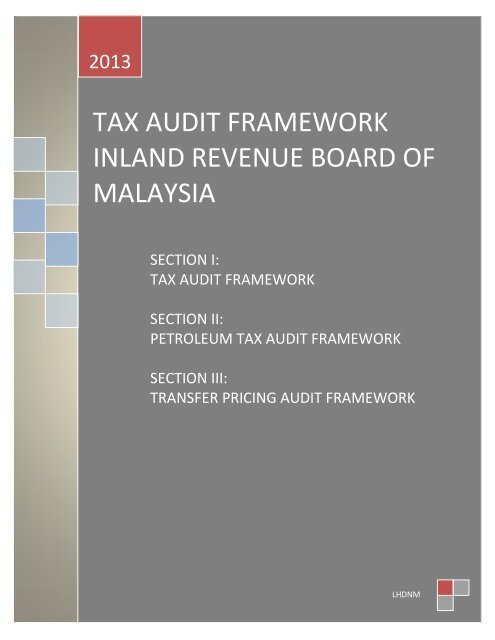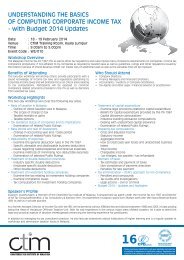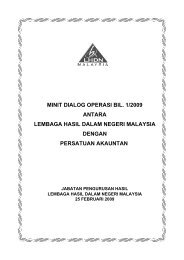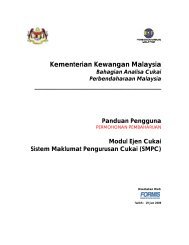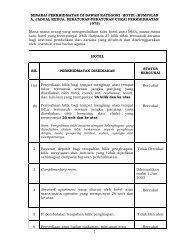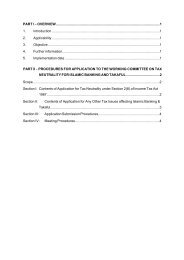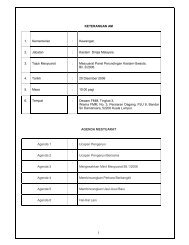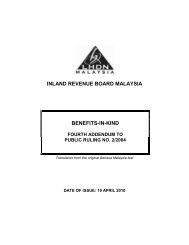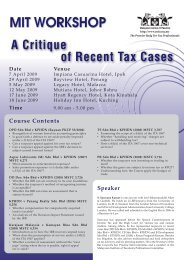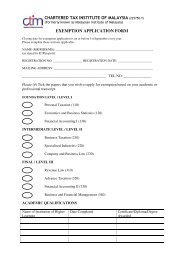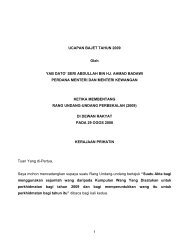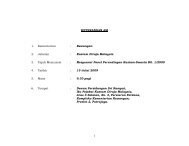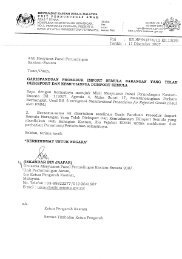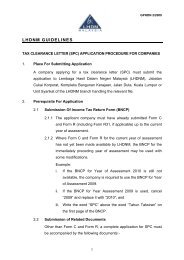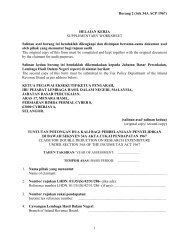The English Version of IRB Tax Audit Framework 2013
The English Version of IRB Tax Audit Framework 2013
The English Version of IRB Tax Audit Framework 2013
You also want an ePaper? Increase the reach of your titles
YUMPU automatically turns print PDFs into web optimized ePapers that Google loves.
<strong>2013</strong><br />
TAX AUDIT FRAMEWORK<br />
INLAND REVENUE BOARD OF<br />
MALAYSIA<br />
SECTION I:<br />
TAX AUDIT FRAMEWORK<br />
SECTION II:<br />
PETROLEUM TAX AUDIT FRAMEWORK<br />
SECTION III:<br />
TRANSFER PRICING AUDIT FRAMEWORK<br />
LHDNM
TAX AUDIT FRAMEWORK<br />
INLAND REVENUE BOARD<br />
MALAYSIA Effective date: 01 April <strong>2013</strong><br />
___________________________________________________________________<br />
i
TAX AUDIT FRAMEWORK<br />
INLAND REVENUE BOARD<br />
MALAYSIA Effective date: 01 April <strong>2013</strong><br />
TABLE OF CONTENTS<br />
Pages<br />
1. INTRODUCTION 1<br />
2. STATUTORY PROVISIONS 1<br />
3. WHAT IS AUDIT? 2<br />
4. OBJECTIVE OF TAX AUDIT 3<br />
5. YEARS OF ASSESSMENT COVERED 4<br />
6. SELECTION OF CASES 4<br />
7. HOW A TAX IS CARRIED OUT 4<br />
7.1 <strong>Audit</strong> Venue 4<br />
7.2 Commencement <strong>of</strong> an <strong>Audit</strong> 5<br />
7.3 <strong>The</strong> Visit 5<br />
7.4 Examination <strong>of</strong> Records 5<br />
7.5 <strong>Audit</strong> Time Frame 8<br />
7.6 Settlement <strong>of</strong> <strong>Audit</strong> 8<br />
8. RIGHTS AND RESPONSIBILITIES 10<br />
8.1 <strong>IRB</strong>M 10<br />
8.2 <strong>Tax</strong>payer 11<br />
8.3 <strong>Tax</strong> Agent / Representative 13<br />
9. CONFIDENTIALITY OF INFORMATION 14<br />
10. OFFENCES AND PENALTIES 14<br />
11. COMPLAINTS 16<br />
12. PAYMENT PROCEDURES 16<br />
13. APPEALS 17<br />
14. EFFECTIVE DATE 17<br />
___________________________________________________________________<br />
ii
TAX AUDIT FRAMEWORK<br />
INLAND REVENUE BOARD<br />
MALAYSIA Effective date: 01 April <strong>2013</strong><br />
1. INTRODUCTION<br />
1.1 A fair, transparent and equitable tax administration system will enhance<br />
public confidence in the tax system. Compliance with tax laws must be<br />
strictly enforced and tax <strong>of</strong>fences such as non-compliance and tax evasion<br />
should be penalized in accordance with the provisions <strong>of</strong> the Income <strong>Tax</strong><br />
Act 1967 (ITA).<br />
1.2 Under the Self-Assessment System, tax audit is a primary activity <strong>of</strong> the<br />
Inland Revenue Board <strong>of</strong> Malaysia (<strong>IRB</strong>M). It is aimed at enhancing<br />
voluntary compliance with the tax laws and regulations. A taxpayer can<br />
be selected for an audit at any time. However, it does not necessarily<br />
mean that a taxpayer who is selected for an audit has committed an<br />
<strong>of</strong>fence.<br />
1.3 This framework is issued by <strong>IRB</strong>M to ensure that tax audit is carried out in<br />
a fair, transparent and impartial manner. This framework outlines the<br />
rights and responsibilities <strong>of</strong> audit <strong>of</strong>ficers, taxpayers and tax agents in<br />
respect <strong>of</strong> a tax audit. Generally, this framework aims to:<br />
1.3.1 Assist audit <strong>of</strong>ficers to carry out their tasks efficiently and effectively;<br />
and<br />
1.3.2 Assist taxpayers in fulfilling their obligations.<br />
2. STATUTORY PROVISIONS<br />
2.1 <strong>The</strong> provisions <strong>of</strong> the ITA which are applicable to tax audits are as follows:<br />
2.1.1 Section 78: Power to call for specific returns and<br />
production <strong>of</strong> books.<br />
2.1.2 Section 79: Power to call for statement <strong>of</strong> bank<br />
accounts, etc.<br />
2.1.3 Section 80: Power <strong>of</strong> access to buildings and documents,<br />
etc.<br />
2.1.4 Section 81: Power to call for information.<br />
1
TAX AUDIT FRAMEWORK<br />
INLAND REVENUE BOARD<br />
MALAYSIA Effective date: 01 April <strong>2013</strong><br />
2.1.5 Section 82: Duty to keep records and give receipts.<br />
2.1.6 Section 99: Right <strong>of</strong> appeal.<br />
2.1.7 Section 100: Extension <strong>of</strong> time for appeal.<br />
2.1.8 Section 101: Review by Director General<br />
2.1.9 Section 102: Disposal <strong>of</strong> appeals.<br />
2.1.10 Section 113: Incorrect returns.<br />
2.1.11 Section 116: Obstruction <strong>of</strong> <strong>of</strong>ficers<br />
2.1.12 Section 119A: Failure to keep records.<br />
2.1.13 Section 120: Other <strong>of</strong>fences.<br />
2.1.14 Section 138: Certain material to be treated as confidential.<br />
2.1.15 Section 138A: Public rulings.<br />
2.1.16 Section 140: Power to disregard certain transactions.<br />
2.1.17 Section 141: Powers regarding certain transactions by nonresidents.<br />
2.2 Statutory provisions relating to tax audit are not limited to the provisions<br />
cited above. Statutory provisions also include the ITA as a whole, Real<br />
Property Gains <strong>Tax</strong> Act 1976, Petroleum (Income <strong>Tax</strong>) Act 1967,<br />
Promotion <strong>of</strong> Investments Act 1986, Stamp Act 1949, Labuan Offshore<br />
Business Activity <strong>Tax</strong> Act 1990 and other acts administered by <strong>IRB</strong>M.<br />
3. WHAT IS A TAX AUDIT?<br />
3.1 A tax audit is an examination <strong>of</strong> a taxpayer’s business records and<br />
financial affairs to ascertain that the right amount <strong>of</strong> income should be<br />
declared and the right amount <strong>of</strong> tax should be calculated and paid are in<br />
accordance with tax laws and regulations. <strong>IRB</strong>M carries out two (2) types<br />
<strong>of</strong> audit, namely desk audit and field audit.<br />
2
TAX AUDIT FRAMEWORK<br />
INLAND REVENUE BOARD<br />
MALAYSIA Effective date: 01 April <strong>2013</strong><br />
3.1.1 Desk <strong>Audit</strong><br />
3.1.1.1 A desk audit is held at the <strong>IRB</strong>M’s <strong>of</strong>fice. Desk audits are<br />
normally concerned with straightforward issues or tax<br />
adjustments which are easily dealt with via<br />
correspondence. A taxpayer may be called for an<br />
interview at <strong>IRB</strong>M’s <strong>of</strong>fice if further information is required.<br />
3.1.1.2 Generally, a desk audit involves checking all information on<br />
income and expenses as well as various types <strong>of</strong> claims<br />
made by a taxpayer in his income tax return.<br />
3.1.1.3 Specific desk audit cases can be referred for field audit<br />
action. Under such circumstances, the taxpayer will be<br />
informed through a field audit notification letter as part <strong>of</strong><br />
the normal process <strong>of</strong> commencing the field audit.<br />
3.1.2 Field <strong>Audit</strong><br />
3.1.2.1 A field audit is one that takes place at a taxpayer’s premise.<br />
It involves the examination <strong>of</strong> the taxpayer’s business<br />
records. In the case <strong>of</strong> a sole-proprietorship or partnership,<br />
if the taxpayer’s business records are incomplete it may<br />
involve the examination <strong>of</strong> non-business records such as<br />
personal bank statements, etc. A taxpayer will be given<br />
notice prior to a field audit.<br />
3.2 In general, this tax audit framework is applicable to both types <strong>of</strong> audit,<br />
namely desk audit and field audit with the exception <strong>of</strong> visit to premises<br />
and examination <strong>of</strong> records which are only applicable to field audit.<br />
4. OBJECTIVE OF TAX AUDIT<br />
4.1 <strong>The</strong> main objective <strong>of</strong> tax audit is to encourage voluntary compliance with<br />
the tax laws and regulations and to ensure that a higher tax compliance<br />
rate is achieved under the Self Assessment System. In this regard, the<br />
audit <strong>of</strong>ficer is required to ensure that the correct amount <strong>of</strong> income has<br />
been reported and the right amount <strong>of</strong> tax has been paid in accordance<br />
with the tax laws and regulations.<br />
4.2 For the purpose <strong>of</strong> achieving voluntary compliance, the tax audit activity is<br />
one <strong>of</strong> the measures undertaken by <strong>IRB</strong>M to educate and create<br />
3
TAX AUDIT FRAMEWORK<br />
INLAND REVENUE BOARD<br />
MALAYSIA Effective date: 01 April <strong>2013</strong><br />
awareness <strong>of</strong> taxpayers towards their rights and responsibilities under the<br />
provisions <strong>of</strong> the ITA.<br />
5. YEARS OF ASSESSMENT COVERED<br />
5.1 Generally, a tax audit covers a period <strong>of</strong> one (1) year <strong>of</strong> assessment,<br />
determined in accordance with the audit focus criteria <strong>of</strong> the department.<br />
5.2 However, the tax audit may be extended to cover a period up to five (5)<br />
years <strong>of</strong> assessment, pursuant to the issues uncovered during an audit.<br />
Further, this 5 year time limit is not applicable to cases involving fraud and<br />
tax evasion whether intentional or unintentional.<br />
6. SELECTION OF CASES<br />
6.1 Cases for audit are selected through the computerized system based on<br />
risk analysis criteria. However, the selection <strong>of</strong> audit cases is not confined<br />
to the selection by the computerized system only, as cases can also be<br />
selected based on information received from various sources.<br />
6.2 <strong>Audit</strong> cases are selected in the following manner:<br />
6.2.1 Selection based on risk analysis;<br />
6.2.2 Information received from third party;<br />
6.2.3 Selection based on specific industries;<br />
6.2.4 Selection based on specific issues for a certain group <strong>of</strong> taxpayers;<br />
and<br />
6.2.5 Selection based on location, etc.<br />
7. HOW A TAX AUDIT IS CARRIED OUT<br />
7.1 <strong>Audit</strong> Venue<br />
7.1.1 A desk audit is carried out at the <strong>IRB</strong>M’s <strong>of</strong>fice whereas a field audit<br />
is carried out at a taxpayer’s business premise.<br />
7.1.2 Where the business premises are not suitable, the taxpayer may<br />
suggest a suitable alternative for <strong>IRB</strong>M’s agreement.<br />
4
TAX AUDIT FRAMEWORK<br />
INLAND REVENUE BOARD<br />
MALAYSIA Effective date: 01 April <strong>2013</strong><br />
7.2 Commencement <strong>of</strong> an <strong>Audit</strong><br />
7.2.1 A taxpayer who is selected for an audit will be notified by <strong>IRB</strong>M<br />
through a letter <strong>of</strong> notification <strong>of</strong> audit. <strong>The</strong> period between the date<br />
<strong>of</strong> notification <strong>of</strong> audit and the audit visit is 14 days. However, with<br />
the agreement <strong>of</strong> the taxpayer, a shorter period <strong>of</strong> notification may<br />
be fixed by <strong>IRB</strong>M. A letter confirming the visit is usually preceded<br />
by a phone call.<br />
7.2.2 A taxpayer may request for the audit visit to be deferred due to<br />
unavoidable circumstances and reasonable grounds.<br />
7.2.3 Other than the intended date <strong>of</strong> the visit, the letter will<br />
indicate the records that should be made available for audit, the<br />
years <strong>of</strong> assessment to be audited and the names <strong>of</strong> audit <strong>of</strong>ficers<br />
who will conduct the audit as well as the expected time frame<br />
required for the audit visit.<br />
7.2.4 A taxpayer may contact the Branch <strong>Audit</strong> Manager or Branch<br />
Director <strong>of</strong> <strong>IRB</strong>M for the purpose <strong>of</strong> confirming the audit visit.<br />
7.3 <strong>The</strong> Visit<br />
7.3.1 An audit visit is only applicable to the field audit activity. <strong>The</strong> audit<br />
normally starts <strong>of</strong>f with an interview.<br />
7.3.2 <strong>The</strong> purpose <strong>of</strong> an interview is to enable the audit <strong>of</strong>ficers to meet<br />
the taxpayer, obtain an overview <strong>of</strong> the taxpayer’s business activity<br />
and to discuss the audit.<br />
7.3.3 <strong>The</strong> taxpayer will be asked to explain his business activities,<br />
accounting and record keeping system. During the audit process,<br />
the person responsible for the handling <strong>of</strong> taxpayer’s business<br />
records will also be interviewed.<br />
7.4 Examination <strong>of</strong> Records<br />
7.4.1 During the course <strong>of</strong> an audit, the audit <strong>of</strong>ficer should be allowed to<br />
examine all business records and to inspect stock and equipments<br />
physically for verification <strong>of</strong> the claims made. Records pertaining to<br />
the years <strong>of</strong> assessment which are already time barred will not be<br />
examined.<br />
5
TAX AUDIT FRAMEWORK<br />
INLAND REVENUE BOARD<br />
MALAYSIA Effective date: 01 April <strong>2013</strong><br />
7.4.2 In certain circumstances, there may be a need to examine records<br />
other than business records where it involves the audit <strong>of</strong> soleproprietorships<br />
and partnerships.<br />
7.4.3 <strong>The</strong> audit <strong>of</strong>ficer will not search for or take possession <strong>of</strong> any record.<br />
Examination <strong>of</strong> records will only be carried out at the taxpayer’s<br />
business premises. If it is deemed necessary, the audit <strong>of</strong>ficer<br />
should be allowed to make copies <strong>of</strong> relevant documents.<br />
7.4.4 However, under circumstances where the work place provided by<br />
the taxpayer is not suitable or conducive to carry out the audit or<br />
where copier facility is not available, the audit <strong>of</strong>ficers, with the<br />
consent <strong>of</strong> the taxpayer, may obtain records for examination at the<br />
<strong>IRB</strong>M’s <strong>of</strong>fice. In such a case, the documents will be returned to the<br />
taxpayer once the examination is done.<br />
7.4.5 <strong>The</strong> documents and records to be taken back will be listed and the<br />
taxpayer may check the documents and records and make a copy<br />
<strong>of</strong> the list, if necessary.<br />
7.4.6 Where records and books <strong>of</strong> accounts are kept in electronic form,<br />
hard copies <strong>of</strong> such records should be made available for<br />
examination. If at the time <strong>of</strong> the audit visit, the taxpayer is unable<br />
to provide the hard copies for examination, the taxpayer should<br />
facilitate and assist the audit <strong>of</strong>ficers to access the computer<br />
system and copy the electronic records onto tapes, disks or<br />
diskettes.<br />
7.4.7 <strong>The</strong> audit <strong>of</strong>ficers will examine all documents and records<br />
necessary to ascertain that the correct amount <strong>of</strong> income has been<br />
reported. Basically, records consists <strong>of</strong>:<br />
7.4.7.1 Business Records<br />
<strong>Tax</strong>payer can obtain guidance in relation to record keeping<br />
from the guidebook and public rulings issued by <strong>IRB</strong>M.<br />
Pursuant to section 138A <strong>of</strong> the ITA, the Director General <strong>of</strong><br />
Inland Revenue (DGIR) is given the power to issue public<br />
rulings on the interpretation <strong>of</strong> any provision <strong>of</strong> the ITA.<br />
<strong>The</strong> following public rulings and a guide book in relation to<br />
record keeping have been issued;<br />
6
TAX AUDIT FRAMEWORK<br />
INLAND REVENUE BOARD<br />
MALAYSIA Effective date: 01 April <strong>2013</strong><br />
i. <strong>IRB</strong>M Public Ruling No. 4/2000: Keeping Sufficient<br />
Records (Companies & Co-operatives);<br />
ii.<br />
iii.<br />
iv.<br />
<strong>IRB</strong>M Public Ruling No. 5/2000: Keeping Sufficient<br />
Records (Individuals & Partnerships);<br />
<strong>IRB</strong>M Public Ruling No. 6/2000: Keeping Sufficient<br />
Records (Persons Other Than Companies, Cooperatives<br />
or Individuals); and<br />
STS-BK4: Self-Assessment – A Guide to Record<br />
Keeping For Business.<br />
7.4.7.2 Records Other Than Business Records<br />
In the audit <strong>of</strong> cases other than companies such as soleproprietorships<br />
and partnerships, the audit <strong>of</strong>ficer may need<br />
to examine records other than business records as follows:<br />
i. Personal bank account statements;<br />
ii.<br />
iii.<br />
iv.<br />
Credit card statements;<br />
Records relating to the ownership <strong>of</strong> assets;<br />
Records relating to the taxpayer’s personal / family<br />
expenses; and<br />
v. Other statements as may be required under section<br />
79 <strong>of</strong> the ITA.<br />
7.4.8 Section 82 and 82A <strong>of</strong> the ITA requires every person to keep and<br />
retain sufficient records when carrying on a business in order to<br />
enable the income or loss from the business to be readily<br />
ascertained. As stipulated in the Public Ruling Nos. 4/2000, 5/2000<br />
and 6/2000, the meaning <strong>of</strong> “records and documents” includes the<br />
following:<br />
7.4.8.1 Books <strong>of</strong> accounts for recording receipts and<br />
payments or income and expenditure;<br />
7.4.8.2 Financial statements;<br />
7
TAX AUDIT FRAMEWORK<br />
INLAND REVENUE BOARD<br />
MALAYSIA Effective date: 01 April <strong>2013</strong><br />
7.4.8.3 Invoices, vouchers, receipts and other documents<br />
that are required to verify entries recorded in the<br />
books <strong>of</strong> accounts; and<br />
7.4.8.4 Documents, objects, materials, articles and things which<br />
are maintained and kept in the form <strong>of</strong> electronic medium.<br />
7.4.8.5 Any other record as may be specified by the DGIR.<br />
7.4.9 Failure to keep sufficient records is an <strong>of</strong>fence under section 119A<br />
<strong>of</strong> the ITA. In relation to this, the audit <strong>of</strong>ficer may apply alternative<br />
approaches or indirect methods for the purpose <strong>of</strong> ascertaining<br />
whether the appropriate amount <strong>of</strong> income has been reported.<br />
7.5 <strong>Audit</strong> Time frame<br />
7.5.1 <strong>The</strong> time required to complete an on-site examination <strong>of</strong> records is<br />
between one (1) to three (3) days. However, the audit time frame<br />
may be extended depending on the following factors:<br />
7.5.1.1 <strong>The</strong> size <strong>of</strong> the business and the complexity <strong>of</strong> business<br />
transactions;<br />
7.5.1.2 <strong>The</strong> form in which records are kept; or<br />
7.5.1.3 <strong>The</strong> extent <strong>of</strong> co-operation from the taxpayer.<br />
7.5.2 <strong>The</strong> audit time frame is applicable only to field audits.<br />
7.6 Settlement <strong>of</strong> <strong>Audit</strong><br />
7.6.1 After concluding the audit work, the audit <strong>of</strong>ficer will prepare an<br />
audit findings report for approval by the Branch <strong>Audit</strong> Manager.<br />
7.6.2 Under certain circumstances, the taxpayer is required to be<br />
present at the <strong>IRB</strong>M’s <strong>of</strong>fice for discussion on the proposed tax<br />
adjustments. <strong>The</strong> audit <strong>of</strong>ficer, together with at least one senior<br />
audit <strong>of</strong>ficer, shall discuss the proposed adjustments with the<br />
taxpayer.<br />
7.6.3 <strong>The</strong> taxpayer, without being called by the <strong>IRB</strong>M, may be present<br />
at <strong>IRB</strong>M’s <strong>of</strong>fice to seek clarification regarding the progress <strong>of</strong> the<br />
8
TAX AUDIT FRAMEWORK<br />
INLAND REVENUE BOARD<br />
MALAYSIA Effective date: 01 April <strong>2013</strong><br />
audit process or to give further information to expedite the<br />
settlement <strong>of</strong> the audit.<br />
7.6.4 <strong>The</strong> taxpayer will be informed <strong>of</strong> the audit findings which will cover<br />
the following areas:<br />
7.6.4.1 <strong>Audit</strong> issues raised;<br />
.<br />
7.6.4.2 Reasons and rationale for raising the audit issues;<br />
7.6.4.3 <strong>The</strong> amount <strong>of</strong> proposed tax adjustments (if any) and the<br />
years <strong>of</strong> assessment involved.<br />
7.6.5 If there are tax adjustments to be made, a notification with details<br />
<strong>of</strong> proposed tax adjustments and rationale for making such<br />
adjustments will be issued. <strong>The</strong> taxpayer will be given the<br />
opportunity to state his views and give explanations on the audit<br />
findings and the proposed tax adjustments forwarded.<br />
7.6.6 A taxpayer is allowed 21 days from the date <strong>of</strong> notification <strong>of</strong><br />
proposed tax adjustments to file an <strong>of</strong>ficial objection if he<br />
disagrees with the proposed tax adjustments. Additional<br />
information and copies <strong>of</strong> evidence should be provided to support<br />
his objection.<br />
7.6.7 If no objection is made within 21 days from the date <strong>of</strong> notification<br />
<strong>of</strong> proposed tax adjustments, the taxpayer shall be deemed to<br />
have agreed to the proposed tax adjustments or where an<br />
objection is found to have no basis in accordance with the<br />
provisions <strong>of</strong> the ITA, the taxpayer will be informed accordingly.<br />
7.6.8 Subsequently, a notice <strong>of</strong> additional assessment with appropriate<br />
penalty imposed under subsection 113 (2) or paragraph 44B (7)<br />
(b) or subsection 112(3) <strong>of</strong> the ITA or a notification <strong>of</strong> nonchargeability<br />
to tax will be issued. However, if there is no<br />
adjustment, a letter will be issued to inform that the audit has<br />
been finalized without any adjustment.<br />
7.6.9 <strong>The</strong> time frame for settlement <strong>of</strong> a tax audit should be 3 months<br />
from the commencement <strong>of</strong> the audit. <strong>IRB</strong>M will inform the<br />
taxpayer on the progress <strong>of</strong> the audit in the event that the case<br />
needs more than 3 months to settle.<br />
9
TAX AUDIT FRAMEWORK<br />
INLAND REVENUE BOARD<br />
MALAYSIA Effective date: 01 April <strong>2013</strong><br />
7.6.10 Once the audit case is settled, the audit should not be repeated<br />
on the same issues for the same year <strong>of</strong> assessment. However, if<br />
there are new issues to be pursued or new information is received,<br />
an audit can be repeated for the same year <strong>of</strong> assessment.<br />
8. RIGHTS AND RESPONSIBILITIES<br />
8.1 <strong>IRB</strong>M<br />
8.1.1 An audit <strong>of</strong>ficer must adhere to rules and codes <strong>of</strong> ethics drawn up<br />
by <strong>IRB</strong>M and is required to carry out his duties in the following<br />
manner:<br />
8.1.1.1 Pr<strong>of</strong>essional, well mannered, trustworthy, honest and<br />
with integrity;<br />
8.1.1.2 Always ready to give explanations on the objectives <strong>of</strong><br />
the tax audit and the rights and responsibilities <strong>of</strong> the<br />
taxpayer;<br />
8.1.1.3 Knowledgeable and fair in administering tax laws;<br />
8.1.1.4 Co-operative and always ready to give advice and<br />
guidance to the taxpayer;<br />
8.1.1.5 Ensure that the audit is carried out smoothly with minimal<br />
disruption to the taxpayer;<br />
8.1.1.6 Request for documents, books <strong>of</strong> accounts and<br />
information that are relevant to the audit only;<br />
8.1.1.7 Explain the proposed tax adjustments and provide<br />
reasonable time for taxpayer to give responses on issues<br />
raised;<br />
8.1.1.8 Ensure the rights and interest <strong>of</strong> taxpayers and tax<br />
agents as well as documents <strong>of</strong> taxpayers are<br />
safeguarded;<br />
8.1.2 Identification <strong>of</strong> an audit <strong>of</strong>ficer<br />
8.1.2.1 Each audit <strong>of</strong>ficer is issued with an authority card<br />
bearing his name and photograph. <strong>The</strong> card also carries<br />
10
TAX AUDIT FRAMEWORK<br />
INLAND REVENUE BOARD<br />
MALAYSIA Effective date: 01 April <strong>2013</strong><br />
a statement that the <strong>of</strong>ficer is authorized to examine<br />
books <strong>of</strong> accounts, documents and records at the<br />
taxpayer’s premises;<br />
8.1.2.2 <strong>Tax</strong>payers are advised to view the authority cards in<br />
order to verify the authenticity <strong>of</strong> audit <strong>of</strong>ficers; and<br />
8.1.2.3 <strong>Tax</strong>payers are advised to check with the Branch Director<br />
<strong>of</strong> <strong>IRB</strong>M if they have doubts on the authenticity <strong>of</strong> audit<br />
<strong>of</strong>ficers.<br />
8.1.3 An audit <strong>of</strong>ficer is prohibited from:<br />
8.2 <strong>Tax</strong>payer<br />
8.1.3.1 Having any personal or financial interest in the business<br />
<strong>of</strong> a taxpayer being audited;<br />
8.1.3.2 Recommending to taxpayer that a certain tax agent be<br />
appointed as the tax agent for the audit case; and<br />
8.1.3.3 Abusing his position or power in carrying out his duties as<br />
provided under section 118 <strong>of</strong> the ITA.<br />
8.2.1 Responsibilities <strong>of</strong> a taxpayer<br />
8.2.1.1 Be co-operative, well mannered, fair, honest and with<br />
integrity;<br />
8.2.1.2 Provide reasonable facilities and assistance to enable the<br />
audit <strong>of</strong>ficer to carry out his duties as outlined in Public<br />
Ruling No. 7/2000 which includes the following:<br />
i. Giving access to the audit <strong>of</strong>ficer to his business<br />
premises, providing information and making available<br />
documents and records required for examination;<br />
ii. Giving explanation regarding the business, the<br />
accounting and information systems;<br />
iii. Giving permission to examine and make copies <strong>of</strong><br />
records, documents and books <strong>of</strong> accounts whether in<br />
the physical and / or electronic medium;<br />
11
TAX AUDIT FRAMEWORK<br />
INLAND REVENUE BOARD<br />
MALAYSIA Effective date: 01 April <strong>2013</strong><br />
iv. Assisting in the provision <strong>of</strong> or providing access to<br />
records, documents and books <strong>of</strong> accounts in the<br />
physical and / or electronic medium; and<br />
v. Allowing the use <strong>of</strong> copiers, telephone or other<br />
communication equipment, lighting and power, <strong>of</strong>fice<br />
space, furniture and providing facilities for copying <strong>of</strong><br />
electronic records onto tapes, disks or diskettes.<br />
8.2.1.3 Co-operate in providing complete responses to all<br />
queries:<br />
i. If questions posed are ambiguous, he may seek<br />
clarification from the audit <strong>of</strong>ficer;<br />
ii. Questions posed normally relate to the business<br />
carried out. However, in the case <strong>of</strong> a sole<br />
proprietorship or a partnership, the taxpayer may also<br />
be queried on personal matters such as personal<br />
expenses, savings, bank account, assets, etc; and<br />
iii. If a taxpayer fails to co-operate and provide the<br />
required information, he shall be deemed to have<br />
committed an <strong>of</strong>fence under the provisions <strong>of</strong> the ITA.<br />
8.2.2 <strong>The</strong> taxpayer is prohibited from:<br />
8.2.2.1 Giving any form <strong>of</strong> gifts to the audit <strong>of</strong>ficer and transacting<br />
any business with the audit <strong>of</strong>ficer during the audit process;<br />
8.2.2.2 Making any form <strong>of</strong> payments to the audit <strong>of</strong>ficer; and<br />
8.2.2.3 Obstructing or hindering the audit <strong>of</strong>ficer in the exercise <strong>of</strong><br />
his functions. Such obstruction is an <strong>of</strong>fence under section<br />
116 <strong>of</strong> the ITA. Obstruction includes the following:<br />
i. Obstructing or refusing an audit <strong>of</strong>ficer from entering<br />
lands, buildings, places and premises to perform his<br />
duties in accordance with section 80 <strong>of</strong> the ITA;<br />
ii. Obstructing an audit <strong>of</strong>ficer from performing his<br />
functions and duties under the provisions <strong>of</strong> the ITA;<br />
12
TAX AUDIT FRAMEWORK<br />
INLAND REVENUE BOARD<br />
MALAYSIA Effective date: 01 April <strong>2013</strong><br />
iii.<br />
iv.<br />
Refusing to provide books <strong>of</strong> accounts, or other<br />
documents in the custody <strong>of</strong> or under his control when<br />
required by the audit <strong>of</strong>ficer;<br />
Failing to provide reasonable assistance to the audit<br />
<strong>of</strong>ficer in carrying out his duties; and<br />
8.3 <strong>Tax</strong> Agent / Representative<br />
v. Refusing to answer or give responses to questions<br />
raised during the course <strong>of</strong> an audit.<br />
8.3.1 <strong>The</strong> taxpayer can request for his tax agent to be present during an<br />
interview. <strong>The</strong> taxpayer is allowed to bring an interpreter to an<br />
interview or discussion session if the taxpayer is not conversant in<br />
Bahasa Malaysia or <strong>English</strong>.<br />
8.3.2 If a taxpayer appoints a new tax agent to handle his audit case, he<br />
should submit a copy <strong>of</strong> the letter <strong>of</strong> appointment.<br />
8.3.3 <strong>The</strong> conduct <strong>of</strong> a tax agent is governed by the code <strong>of</strong> ethics<br />
formulated by <strong>IRB</strong>M based on the principles <strong>of</strong> integrity,<br />
accountability, transparency and social responsibility.<br />
8.3.4 <strong>The</strong> tax agent is required to carry out his duties in the following<br />
manner:<br />
8.3.4.1 Pr<strong>of</strong>essional, be fully conversant with tax laws and<br />
practices and with integrity;<br />
8.3.4.2 Be honest, trustworthy, transparent and give fullest cooperation<br />
when dealing with the taxpayer and <strong>IRB</strong>M such<br />
as informing <strong>IRB</strong>M on ceasing to be the tax agent <strong>of</strong> a<br />
taxpayer and adhere to rules and guidelines laid down by<br />
<strong>IRB</strong>M;<br />
8.3.4.3 Refrain from misusing information acquired or abusing his<br />
position as a tax agent for his own personal advantage;<br />
8.3.4.4 Always give complete and accurate feedback relating to<br />
the progress <strong>of</strong> an audit and advise the taxpayer accurately<br />
based on the true facts <strong>of</strong> the audit case; and<br />
13
TAX AUDIT FRAMEWORK<br />
INLAND REVENUE BOARD<br />
MALAYSIA Effective date: 01 April <strong>2013</strong><br />
8.3.4.5 Safeguard the confidentiality <strong>of</strong> all information and ensure<br />
that the information is not disclosed to any unauthorized<br />
party (subsection 138 (5) <strong>of</strong> the ITA).<br />
8.3.5 <strong>The</strong> tax agent is prohibited from:<br />
8.3.5.1 Giving wrong advice to taxpayers and collaborating<br />
with taxpayers to avoid paying the correct amount <strong>of</strong><br />
taxes;<br />
8.3.5.2 Delaying the work <strong>of</strong> a tax audit or acting irresponsibly<br />
towards his entrusted duties; and<br />
8.3.5.3 Offering any form <strong>of</strong> gifts to the audit <strong>of</strong>ficers.<br />
9. CONFIDENTIALITY OF INFORMATION<br />
<strong>IRB</strong>M will ensure confidentiality <strong>of</strong> all information obtained from the taxpayer<br />
during an interview, discussion, through correspondence or examination <strong>of</strong><br />
records and that it is utilized for tax purposes only.<br />
10. OFFENCES AND PENALTIES<br />
10.1 If it is discovered after the commencement an audit that there has been an<br />
understatement or omission <strong>of</strong> income, a penalty will be imposed under<br />
subsection 113(2) or paragraph 44B(7)(b)* <strong>of</strong> the ITA in which the penalty<br />
rate equal to the amount <strong>of</strong> tax undercharged (100%) accordingly.<br />
However, the DGIR in exercising his discretionary powers may consider a<br />
lower penalty <strong>of</strong> 45% to be imposed.<br />
10.2 <strong>The</strong> concessionary penalty rates may be imposed in cases where the<br />
taxpayer makes a voluntary disclosure. As such the taxpayer is<br />
encouraged to make a voluntary disclosure regarding the omitted income<br />
before the commencement <strong>of</strong> an audit. This disclosure must be made in<br />
writing to the relevant Branch Director <strong>of</strong> <strong>IRB</strong>M.<br />
10.3 Where taxpayer who furnishes a return form on or before the due date and<br />
the Director General has made an assessment for that year <strong>of</strong><br />
assessment under subsection 91, ITA 1967 subsequently makes a<br />
voluntary disclosure after the due date but not later than 6 months from<br />
the due date, the penalty rates are as follows:<br />
14
TAX AUDIT FRAMEWORK<br />
INLAND REVENUE BOARD<br />
MALAYSIA Effective date: 01 April <strong>2013</strong><br />
Table I<br />
Period <strong>of</strong> making voluntary disclosure<br />
Within 60 days from the due date for furnishing the return<br />
form<br />
More than 60 days but not later than 6 months from the<br />
due date for furnishing the return form<br />
Rate<br />
10%<br />
15.5%<br />
* Paragraph 44B (7) (b) is deemed to have effect for the years <strong>of</strong> assessment 2008, 2009 and 2010.<br />
10.4 <strong>The</strong> concessionary penalty rates for voluntary disclosure other than cases<br />
mentioned in paragraph 10.3 are as follows:<br />
Table II<br />
Voluntary disclosure before case is<br />
selected for audit.<br />
Field <strong>Audit</strong><br />
Period from the due<br />
date <strong>of</strong> submitting<br />
return form<br />
Up to 6 months<br />
Rate<br />
Table I<br />
applies<br />
> 6 months to 1 year 20%<br />
> 1 year to 3 years 25%<br />
> 3 years and above 30%<br />
Not applicable 35%<br />
Voluntary disclosure after taxpayer<br />
has been informed but before<br />
commencement <strong>of</strong> examination <strong>of</strong><br />
documents during audit visit.<br />
Desk <strong>Audit</strong><br />
Voluntary disclosure after letter <strong>of</strong><br />
request for documents is issued to<br />
taxpayer but before the<br />
commencement <strong>of</strong> examination <strong>of</strong><br />
documents submitted.<br />
15
TAX AUDIT FRAMEWORK<br />
INLAND REVENUE BOARD<br />
MALAYSIA Effective date: 01 April <strong>2013</strong><br />
11. COMPLAINTS<br />
11.1 If the taxpayer is dissatisfied with the manner in which an audit is being<br />
carried out, including the behaviour <strong>of</strong> an audit <strong>of</strong>ficer, he may make an<br />
<strong>of</strong>ficial complaint to the <strong>IRB</strong>M Branch Director / State Director / Director <strong>of</strong><br />
Compliance Department / Deputy Director General <strong>of</strong> Inland Revenue /<br />
Director General <strong>of</strong> Inland Revenue.<br />
11.2 <strong>IRB</strong>M will act fairly, objectively and impartially on all complaints received.<br />
11.3 <strong>IRB</strong>M will not entertain any complaint which is found to have no basis and<br />
not made in good faith.<br />
11.4 <strong>IRB</strong>M will take action and file a complaint with the relevant authority such<br />
as Ministry <strong>of</strong> Finance / Malaysian Institute <strong>of</strong> <strong>Tax</strong>ation / Malaysian<br />
Institute <strong>of</strong> Accountants / Malaysian Institute <strong>of</strong> Certified Public<br />
Accountants / Malaysian Association <strong>of</strong> <strong>Tax</strong> Agents / Bar Council, if tax<br />
agents or their representatives do not co-operate or behave<br />
unpr<strong>of</strong>essionally which is inconsistent with their code <strong>of</strong> ethics.<br />
12. PAYMENT PROCEDURES<br />
12.1 Any taxes and penalties to be paid arising out <strong>of</strong> an audit must be made to<br />
the DGIR through any appointed bank or any Collection Branch <strong>of</strong> <strong>IRB</strong>M.<br />
12.2 <strong>The</strong> taxpayer is required to make full payment <strong>of</strong> taxes and penalties<br />
arising out <strong>of</strong> an audit.<br />
12.3 If the taxpayer is unable to make full payment <strong>of</strong> tax, <strong>IRB</strong>M may consider<br />
the taxpayer’s application for settling the total tax liability by installments,<br />
for a predetermined period.<br />
12.4 Application for installment payment scheme should be submitted to the<br />
relevant Branch Director <strong>of</strong> <strong>IRB</strong>M for approval.<br />
12.5 Where a taxpayer fails to adhere to the installment payment scheme<br />
agreed upon, late payment penalty on the balance <strong>of</strong> tax outstanding will<br />
be imposed.<br />
16
TAX AUDIT FRAMEWORK<br />
INLAND REVENUE BOARD<br />
MALAYSIA Effective date: 01 April <strong>2013</strong><br />
13. APPEALS<br />
Section 99 to 102 <strong>of</strong> the ITA lay the ground rules for appeals relating to<br />
assessment raised by <strong>IRB</strong>M.<br />
13.1 A taxpayer can appeal against an assessment as a result <strong>of</strong> a tax audit.<br />
13.2 <strong>The</strong> appeal must be made to the Special Commissioners <strong>of</strong> Income <strong>Tax</strong><br />
within 30 days after the service <strong>of</strong> the notice <strong>of</strong> additional assessment.<br />
13.3 Should either party be dissatisfied with the decision <strong>of</strong> the Special<br />
Commissioners <strong>of</strong> Income <strong>Tax</strong>, the aggrieved party may apply to have the<br />
case heard in the High Court and further the Court <strong>of</strong> Appeal.<br />
14. EFFECTIVE DATE<br />
This framework is effective from 1 April <strong>2013</strong> and not applicable to audit cases<br />
involving transfer pricing, thin capitalization and advance pricing arrangement.<br />
This tax audit framework shall replace the tax audit framework issued in January<br />
2009.<br />
Director General <strong>of</strong> Inland Revenue<br />
Malaysia<br />
April <strong>2013</strong><br />
17
PETROLEUM TAX<br />
AUDIT FRAMEWORK<br />
INLAND REVENUE BOARD OF MALAYSIA<br />
Effective date: 01 April <strong>2013</strong><br />
___________________________________________________________________<br />
___________________________________________________________________<br />
i
PETROLEUM TAX<br />
AUDIT FRAMEWORK<br />
INLAND REVENUE BOARD OF MALAYSIA<br />
Effective date: 01 April <strong>2013</strong><br />
___________________________________________________________________<br />
TABLE OF CONTENTS<br />
Pages<br />
1. INTRODUCTION 1<br />
2. STATUTORY PROVISIONS 1<br />
3. WHAT IS A TAX AUDIT? 2<br />
4. OBJECTIVE OF TAX AUDIT 3<br />
5. YEARS OF ASSESSMENT COVERED 3<br />
6. SELECTION OF CASES 3<br />
7. HOW A TAX AUDIT IS CARRIED OUT 4<br />
7.1 <strong>Audit</strong> Venue 4<br />
7.2 Commencement <strong>of</strong> an <strong>Audit</strong> 4<br />
7.3 <strong>The</strong> Visit 4<br />
7.4 Examination <strong>of</strong> Records 5<br />
7.5 <strong>Audit</strong> Timeframe 6<br />
7.6 Settlement <strong>of</strong> <strong>Audit</strong> 6<br />
8. RIGHTS AND RESPONSIBILITIES 8<br />
8.1 <strong>IRB</strong>M 8<br />
8.2 <strong>Tax</strong>payer 9<br />
8.3 <strong>Tax</strong> Agent / Representative 11<br />
9. CONFIDENTIALITY OF INFORMATION 12<br />
10. OFFENCES AND PENALTIES 12<br />
11. COMPLAINTS 13<br />
12. PAYMENT PROCEDURES 14<br />
13. APPEALS 14<br />
14. EFFECTIVE DATE 15<br />
___________________________________________________________________<br />
ii
PETROLEUM TAX AUDIT FRAMEWORK<br />
INLAND REVENUE BOARD<br />
MALAYSIA Effective date: 01 April <strong>2013</strong><br />
1. INTRODUCTION<br />
1.1 A fair, transparent and equitable tax administration system will enhance<br />
public confidence in the tax system. Compliance with tax laws must be<br />
strictly enforced and tax <strong>of</strong>fences such as non-compliance and tax evasion<br />
should be penalized in accordance with the provisions <strong>of</strong> the Petroleum<br />
(Income <strong>Tax</strong>) Act 1967 (PITA).<br />
1.2 Under the Self-Assessment System, tax audit is a primary activity <strong>of</strong> the<br />
Inland Revenue Board <strong>of</strong> Malaysia (<strong>IRB</strong>M). It is aimed at enhancing<br />
voluntary compliance with the tax laws and regulations. A taxpayer can be<br />
selected for an audit at any time. However, it does not necessarily mean<br />
that a taxpayer who is selected for an audit has committed an <strong>of</strong>fence.<br />
1.3 This framework is issued by <strong>IRB</strong>M to ensure that tax audit is carried out in<br />
a fair, transparent and impartial manner. This framework outlines the<br />
rights and responsibilities <strong>of</strong> audit <strong>of</strong>ficers, taxpayers and tax agents in<br />
respect <strong>of</strong> a tax audit. Generally, this framework aims to:<br />
1.3.1 Assist audit <strong>of</strong>ficers to carry out their tasks efficiently and effectively;<br />
and<br />
1.3.2 Assist taxpayers in fulfilling their obligations.<br />
2. STATUTORY PROVISIONS<br />
2.1 <strong>The</strong> provisions <strong>of</strong> the PITA which are applicable to tax audits are as<br />
follows:<br />
2.1.1 Section 31: Power to call for specific returns and production <strong>of</strong><br />
books.<br />
2.1.2 Section 32: Power to call for statement <strong>of</strong> bank accounts, etc.<br />
2.1.3 Section 33: Power <strong>of</strong> access to buildings and documents, etc.<br />
2.1.4 Section 34: Power to call for information<br />
2.1.5 Section 34A: Duty to keep records.<br />
2.1.6 Section 43: Right <strong>of</strong> appeal<br />
2.1.7 Section 44: Extension <strong>of</strong> time for appeal<br />
Translation from the original<br />
Bahasa Malaysia text<br />
1
PETROLEUM TAX AUDIT FRAMEWORK<br />
INLAND REVENUE BOARD<br />
MALAYSIA Effective date: 01 April <strong>2013</strong><br />
2.1.8 Section 45: Review by Director General<br />
2.1.9 Section 46: Disposal <strong>of</strong> appeals<br />
2.1.10 Section 51: Failure to furnish return<br />
2.1.11 Section 52: Incorrect returns<br />
2.1.12 Section 54: Obstruction <strong>of</strong> <strong>of</strong>ficers<br />
2.1.13 Section 58: Other <strong>of</strong>fences<br />
2.1.14 Section 71: Certain materials to be treated as confidential<br />
2.1.15 Section 72: Power to disregard certain transactions<br />
2.2 Statutory provisions relating to tax audit are not limited to the provisions<br />
cited above. Statutory provisions also include the Petroleum (Income <strong>Tax</strong>)<br />
Act 1967 as a whole.<br />
3. WHAT IS A TAX AUDIT?<br />
3.1 A tax audit is an examination <strong>of</strong> a taxpayer’s business records and<br />
financial affairs to ascertain that the right amount <strong>of</strong> income should be<br />
declared and the right amount <strong>of</strong> tax should be calculated and paid are in<br />
accordance with tax laws and regulations. <strong>IRB</strong>M carries out two (2) types<br />
<strong>of</strong> audit, namely desk audit and field audit.<br />
3.1.1 Desk <strong>Audit</strong><br />
3.1.1.1 A desk audit is held at the <strong>IRB</strong>M’s <strong>of</strong>fice. Desk audits are<br />
normally concerned with straightforward issues or tax<br />
adjustments which are easily dealt with via<br />
correspondence. A taxpayer may be called for an interview<br />
at <strong>IRB</strong>M’s <strong>of</strong>fice if further information is required.<br />
3.1.1.2 Generally, a desk audit involves checking all information on<br />
income and expenses as well as various types <strong>of</strong> claims<br />
made by a taxpayer in his income tax return.<br />
3.1.1.3 Specific desk audit cases can be referred for field audit<br />
action. Under such circumstances, the taxpayer will be<br />
Translation from the original<br />
Bahasa Malaysia text<br />
2
PETROLEUM TAX AUDIT FRAMEWORK<br />
INLAND REVENUE BOARD<br />
MALAYSIA Effective date: 01 April <strong>2013</strong><br />
3.1.2 Field <strong>Audit</strong><br />
informed through a field audit notification letter as part <strong>of</strong><br />
the normal process <strong>of</strong> commencing the field audit.<br />
3.1.2.1 A field audit is one that takes place at a taxpayer’s premise.<br />
It involves the examination <strong>of</strong> the taxpayer’s business<br />
records. A taxpayer will be given notice prior to a field audit.<br />
3.2 In general, this tax audit framework is applicable to both types <strong>of</strong> audit,<br />
namely desk audit and field audit with the exception <strong>of</strong> visit to premises<br />
and examination <strong>of</strong> records which are only applicable to field audit.<br />
4. OBJECTIVE OF TAX AUDIT<br />
4.1 <strong>The</strong> main objective <strong>of</strong> tax audit is to encourage voluntary compliance with<br />
the tax laws and regulations and to ensure that a higher tax compliance<br />
rate is achieved under the Self Assessment System. In this regard, the<br />
audit <strong>of</strong>ficer is required to ensure that the correct amount <strong>of</strong> income has<br />
been reported and the right amount <strong>of</strong> tax has been paid in accordance<br />
with the tax laws and regulations.<br />
4.2 For the purpose <strong>of</strong> achieving voluntary compliance, the tax audit activity is<br />
one <strong>of</strong> the measures undertaken by <strong>IRB</strong>M to educate and create<br />
awareness <strong>of</strong> taxpayers towards their rights and responsibilities under the<br />
provisions <strong>of</strong> the PITA.<br />
5. YEARS OF ASSESSMENT COVERED<br />
5.1 Generally, a tax audit may cover a period <strong>of</strong> one to three years <strong>of</strong><br />
assessment determined in accordance with the audit focus.<br />
5.2 However, the years <strong>of</strong> assessment to be covered in a tax audit may<br />
extend beyond the period as stated in paragraph 5.1 depending on the<br />
issues identified during an audit.<br />
6. SELECTION OF CASES<br />
6.1 Cases for audit are selected by a committee in the <strong>Tax</strong> Compliance<br />
Department (TCD) based on risk analysis criteria.<br />
6.2 An audit can be carried out simultaneously by the Petroleum Division and<br />
the Non Resident Branch (NRB), if the same tax payer is selected for audit<br />
Translation from the original<br />
Bahasa Malaysia text<br />
3
PETROLEUM TAX AUDIT FRAMEWORK<br />
INLAND REVENUE BOARD<br />
MALAYSIA Effective date: 01 April <strong>2013</strong><br />
by the TCD. <strong>The</strong> Petroleum Division will have to exclude the withholding<br />
tax issue from the scope and determination <strong>of</strong> audit, to enable the NRB to<br />
fully audit the issue.<br />
7. HOW A TAX AUDIT IS CARRIED OUT<br />
7.1 <strong>Audit</strong> Venue<br />
7.1.1 A desk audit is carried out at the <strong>IRB</strong>M’s <strong>of</strong>fice whereas a field audit<br />
is carried out at a taxpayer’s business premise.<br />
7.1.2 Where the business premises are not suitable, the taxpayer may<br />
suggest a suitable alternative for <strong>IRB</strong>M’s agreement.<br />
7.2 Commencement <strong>of</strong> an <strong>Audit</strong><br />
7.2.1 A taxpayer who is selected for an audit will be notified by <strong>IRB</strong>M<br />
through a letter <strong>of</strong> notification <strong>of</strong> audit. <strong>The</strong> period between the date<br />
<strong>of</strong> notification <strong>of</strong> audit and the audit visit is 14 days. However, with<br />
the agreement <strong>of</strong> the taxpayer, a shorter period <strong>of</strong> notification may<br />
be fixed by <strong>IRB</strong>M. A letter confirming the visit is usually preceded<br />
by a phone call.<br />
7.2.2 A taxpayer may request for the audit visit to be deferred due to<br />
unavoidable circumstances and reasonable grounds.<br />
7.2.3 Other than the intended date <strong>of</strong> the visit, the letter will indicate the<br />
records that should be made available for audit, the years <strong>of</strong><br />
assessment to be audited and the names <strong>of</strong> audit <strong>of</strong>ficers who will<br />
conduct the audit as well as the expected timeframe required for<br />
the audit visit.<br />
7.2.4 A taxpayer may contact the Director <strong>of</strong> Petroleum Division, <strong>IRB</strong>M<br />
for the purpose <strong>of</strong> confirming the audit visit.<br />
7.3 <strong>The</strong> Visit<br />
7.3.1 An audit visit is only applicable to the field audit activity. <strong>The</strong> audit<br />
normally starts <strong>of</strong>f with a presentation <strong>of</strong> the company’s background,<br />
business activities, accounting and record keeping system.<br />
7.3.2 During the presentation, the audit <strong>of</strong>ficers can get a better<br />
understanding through the Q&A session.<br />
Translation from the original<br />
Bahasa Malaysia text<br />
4
PETROLEUM TAX AUDIT FRAMEWORK<br />
INLAND REVENUE BOARD<br />
MALAYSIA Effective date: 01 April <strong>2013</strong><br />
7.3.3 During the audit process, the person responsible for the handling <strong>of</strong><br />
taxpayer’s business records will also be interviewed.<br />
7.4 Examination <strong>of</strong> Records<br />
7.4.1 During the course <strong>of</strong> an audit, the audit <strong>of</strong>ficer should be allowed to<br />
examine all business records and to inspect stock and equipments<br />
physically for verification <strong>of</strong> the claims made. Records pertaining to<br />
the years <strong>of</strong> assessment which are already time barred will not be<br />
examined.<br />
7.4.2 <strong>The</strong> audit <strong>of</strong>ficer will not search for or take possession <strong>of</strong> any record.<br />
Examination <strong>of</strong> records will only be carried out at the taxpayer’s<br />
business premises. If it is deemed necessary, the audit <strong>of</strong>ficer<br />
should be allowed to make copies <strong>of</strong> relevant documents.<br />
7.4.3 However, under circumstances where the work place provided by<br />
the taxpayer is not suitable or conducive to carry out the audit or<br />
where copier facility is not available, the audit <strong>of</strong>ficers, with the<br />
consent <strong>of</strong> the taxpayer, may obtain records for examination at the<br />
<strong>IRB</strong>M’s <strong>of</strong>fice. In such a case, the documents will be returned to the<br />
taxpayer once the examination is done.<br />
7.4.4 <strong>The</strong> documents and records to be taken back will be listed and the<br />
taxpayer may check the documents and records and make a copy<br />
<strong>of</strong> the list, if necessary.<br />
7.4.5 Where records and books <strong>of</strong> accounts are kept in electronic form,<br />
hard copies <strong>of</strong> such records should be made available for<br />
examination. If at the time <strong>of</strong> the audit visit, the taxpayer is unable<br />
to provide the hard copies for examination, the taxpayer should<br />
facilitate and assist the audit <strong>of</strong>ficers to access the computer<br />
system and copy the electronic records onto tapes, disks or<br />
diskettes.<br />
7.4.6 <strong>The</strong> audit <strong>of</strong>ficers will examine all documents and records<br />
necessary to ascertain that the correct amount <strong>of</strong> income has been<br />
reported.<br />
7.4.7 Section 34A <strong>of</strong> the PITA requires every person to keep and retain<br />
sufficient records when carrying on a business in order to enable<br />
Translation from the original<br />
Bahasa Malaysia text<br />
5
PETROLEUM TAX AUDIT FRAMEWORK<br />
INLAND REVENUE BOARD<br />
MALAYSIA Effective date: 01 April <strong>2013</strong><br />
7.5 <strong>Audit</strong> Timeframe<br />
the income or loss from the business to be readily ascertained.<br />
“Records” includes the following:<br />
7.4.7.1 Books <strong>of</strong> accounts for recording receipts and payments or<br />
income and expenditure;<br />
7.4.7.2 Invoices, vouchers, receipts and other documents that are<br />
required to verify entries recorded in the books <strong>of</strong> accounts;<br />
and<br />
7.4.7.3 Documents, objects, materials, articles and things are<br />
maintained and kept in the form <strong>of</strong> electronic medium.<br />
7.4.7.4 Any other record as may be specified by the DGIR.<br />
7.5.1 <strong>The</strong> minimum time required to complete an on-site examination <strong>of</strong><br />
records is 5 days. However, the audit timeframe may be extended<br />
depending on the following factors:<br />
7.5.1.1 <strong>The</strong> size <strong>of</strong> the business and the complexity <strong>of</strong> business<br />
transactions;<br />
7.5.1.2 <strong>The</strong> form in which records are kept; or<br />
7.5.1.3 <strong>The</strong> extent <strong>of</strong> co-operation from the taxpayer.<br />
7.5.1.4 <strong>The</strong> number <strong>of</strong> partners with different locations.<br />
7.6 Settlement <strong>of</strong> <strong>Audit</strong><br />
7.6.1 After concluding the audit work, the audit <strong>of</strong>ficer will prepare an<br />
audit findings report for approval by the Director <strong>of</strong> Petroleum<br />
Division.<br />
7.6.2 Under certain circumstances, the taxpayer is required to be<br />
present at the <strong>IRB</strong>M’s <strong>of</strong>fice for discussion on the proposed tax<br />
adjustments. <strong>The</strong> audit <strong>of</strong>ficer, together with at least one senior<br />
audit <strong>of</strong>ficer, shall discuss the proposed adjustments with the<br />
taxpayer.<br />
Translation from the original<br />
Bahasa Malaysia text<br />
6
PETROLEUM TAX AUDIT FRAMEWORK<br />
INLAND REVENUE BOARD<br />
MALAYSIA Effective date: 01 April <strong>2013</strong><br />
7.6.3 <strong>The</strong> taxpayer, without being called by the <strong>IRB</strong>M, may be present<br />
at <strong>IRB</strong>M’s <strong>of</strong>fice to seek clarification regarding the progress <strong>of</strong> the<br />
audit process or to give further information to expedite the<br />
settlement <strong>of</strong> the audit.<br />
7.6.4 <strong>The</strong> taxpayer will be informed <strong>of</strong> the audit findings which will cover<br />
the following areas:<br />
7.6.4.1 <strong>Audit</strong> issues raised;<br />
.<br />
7.6.4.2 Reasons and rationale for raising the audit issues;<br />
7.6.4.3 <strong>The</strong> amount <strong>of</strong> proposed tax adjustments (if any) and the<br />
years <strong>of</strong> assessment involved.<br />
7.6.5 If there are tax adjustments to be made, a notification with details<br />
<strong>of</strong> proposed tax adjustments and rationale for making such<br />
adjustments will be issued. <strong>The</strong> taxpayer will be given the<br />
opportunity to state his views and give explanations on the audit<br />
findings and the proposed tax adjustments forwarded.<br />
7.6.6 A taxpayer is allowed 21 days from the date <strong>of</strong> notification <strong>of</strong><br />
proposed tax adjustments to file an <strong>of</strong>ficial objection if he<br />
disagrees with the proposed tax adjustments. Additional<br />
information and copies <strong>of</strong> evidence should be provided to support<br />
his objection.<br />
7.6.7 If no objection is made within 21 days from the date <strong>of</strong> notification<br />
<strong>of</strong> proposed tax adjustments, the taxpayer shall be deemed to<br />
have agreed to the proposed tax adjustments or where an<br />
objection is found to have no basis in accordance with the<br />
provisions <strong>of</strong> the PITA, the taxpayer will be informed accordingly.<br />
7.6.8 Subsequently, a notice <strong>of</strong> additional assessment with appropriate<br />
penalty imposed under subsection 52(2) or subsection 51(3) <strong>of</strong><br />
the PITA or a notification <strong>of</strong> non-chargeability to tax will be issued.<br />
However, if there is no adjustment, a letter will be issued to inform<br />
that the audit has been finalized without any adjustment.<br />
7.6.9 <strong>The</strong> timeframe for settlement <strong>of</strong> a tax audit should be within 240<br />
days from the last day <strong>of</strong> the audit. In the event that a case has<br />
exceeded the above period without any action being taken, <strong>IRB</strong>M<br />
will then notify the taxpayer by mail or email.<br />
Translation from the original<br />
Bahasa Malaysia text<br />
7
PETROLEUM TAX AUDIT FRAMEWORK<br />
INLAND REVENUE BOARD<br />
MALAYSIA Effective date: 01 April <strong>2013</strong><br />
7.6.10 Once the audit case is settled, it will not be audited again for the<br />
same year <strong>of</strong> assessment on the same issues. However, if there<br />
are new issues to be pursued or new information is received, an<br />
audit can be repeated for the same year <strong>of</strong> assessment.<br />
8. RIGHTS AND RESPONSIBILITIES<br />
8.1 <strong>IRB</strong>M<br />
8.1.1 An audit <strong>of</strong>ficer must adhere to rules and codes <strong>of</strong> ethics drawn up<br />
by <strong>IRB</strong>M and is required to carry out his duties in the following<br />
manner:<br />
8.1.1.1 Pr<strong>of</strong>essional, well mannered, trustworthy, honest and<br />
with integrity;<br />
8.1.1.2 Always ready to give explanations on the objectives <strong>of</strong><br />
the tax audit and the rights and responsibilities <strong>of</strong> the<br />
taxpayer;<br />
8.1.1.3 Knowledgeable and fair in administering tax laws;<br />
8.1.1.4 Co-operative and always ready to give advice and<br />
guidance to the taxpayer;<br />
8.1.1.5 Ensure that the audit is carried out smoothly with minimal<br />
disruption to the taxpayer;<br />
8.1.1.6 Request for documents, books <strong>of</strong> accounts and<br />
information that are relevant to the audit only;<br />
8.1.1.7 Explain the proposed tax adjustments and provide<br />
reasonable time for taxpayer to give responses on issues<br />
raised.<br />
8.1.1.8 Ensure the rights and interest <strong>of</strong> taxpayers and tax<br />
agents as well as documents <strong>of</strong> taxpayers are<br />
safeguarded;<br />
Translation from the original<br />
Bahasa Malaysia text<br />
8
PETROLEUM TAX AUDIT FRAMEWORK<br />
INLAND REVENUE BOARD<br />
MALAYSIA Effective date: 01 April <strong>2013</strong><br />
8.1.2 Identification <strong>of</strong> an audit <strong>of</strong>ficer<br />
8.1.2.1 Each audit <strong>of</strong>ficer is issued with an authority card bearing<br />
his name and photograph. <strong>The</strong> card also carries a<br />
statement that the <strong>of</strong>ficer is authorized to examine books<br />
<strong>of</strong> accounts, documents and records at the taxpayer’s<br />
premises;<br />
8.1.2.2 <strong>Tax</strong>payers are advised to view the authority cards in<br />
order to verify the authenticity <strong>of</strong> audit <strong>of</strong>ficers; and<br />
8.1.2.3 <strong>Tax</strong>payers may check with the Director <strong>of</strong> Petroleum<br />
Division if they have doubts on the authenticity <strong>of</strong> audit<br />
<strong>of</strong>ficers.<br />
8.1.3 An audit <strong>of</strong>ficer is prohibited from:<br />
8.2 <strong>Tax</strong>payer<br />
8.1.3.1 Having any personal or financial interest in the business<br />
<strong>of</strong> a taxpayer being audited;<br />
8.1.3.2 Recommending to taxpayer that a certain tax agent be<br />
appointed as the tax agent for the audit case; and<br />
8.1.3.3 Abusing his position or power in carrying out his duties<br />
as provided under section 56 <strong>of</strong> the PITA.<br />
8.2.1 Responsibilities <strong>of</strong> a taxpayer<br />
8.2.1.1 Be co-operative, well mannered, fair, honest and with<br />
integrity;<br />
8.2.1.2 Provide reasonable facilities and assistance to enable the<br />
audit <strong>of</strong>ficer to carry out his duties as outlined in Section<br />
33 PITA which includes the following:<br />
i. Giving access to the audit <strong>of</strong>ficer to his business<br />
premises, providing information and making available<br />
documents and records required for examination;<br />
ii. Giving explanation regarding the business, the<br />
accounting and information systems;<br />
Translation from the original<br />
Bahasa Malaysia text<br />
9
PETROLEUM TAX AUDIT FRAMEWORK<br />
INLAND REVENUE BOARD<br />
MALAYSIA Effective date: 01 April <strong>2013</strong><br />
iii. Giving permission to examine and make copies <strong>of</strong><br />
records, documents and books <strong>of</strong> accounts whether in<br />
the physical and / or electronic medium;<br />
iv. Assisting in the provision <strong>of</strong> or providing access to<br />
records, documents and books <strong>of</strong> accounts in the<br />
physical and / or electronic medium; and<br />
v. Allowing the use <strong>of</strong> copiers, telephone or other<br />
communication equipment, lighting and power, <strong>of</strong>fice<br />
space, furniture and providing facilities for copying <strong>of</strong><br />
electronic records onto tapes, disks or diskettes.<br />
8.2.1.3 Co-operate in providing complete responses to all<br />
queries:<br />
i. If questions posed are ambiguous, he may seek<br />
clarification from the audit <strong>of</strong>ficer;<br />
ii.<br />
If a taxpayer fails to co-operate and provide the<br />
required information, he shall be deemed to have<br />
committed an <strong>of</strong>fence under the provisions <strong>of</strong> the<br />
PITA.<br />
8.2.2 <strong>The</strong> taxpayer is prohibited from:<br />
8.2.2.1 Giving any form <strong>of</strong> gifts to the audit <strong>of</strong>ficer and transacting<br />
any business with the audit <strong>of</strong>ficer during the audit process;<br />
8.2.2.2 Making any form <strong>of</strong> payments to the audit <strong>of</strong>ficer; and<br />
8.2.2.3 Obstructing or hindering the audit <strong>of</strong>ficer in the exercise <strong>of</strong><br />
his functions. Such obstruction is an <strong>of</strong>fence under section<br />
54 <strong>of</strong> the PITA. Obstruction includes the following:<br />
i. Obstructing or refusing an audit <strong>of</strong>ficer from entering<br />
lands, buildings, places and premises to perform his<br />
duties in accordance with section 33 <strong>of</strong> the PITA;<br />
ii.<br />
Obstructing an audit <strong>of</strong>ficer from performing his<br />
functions and duties under the provisions <strong>of</strong> the PITA ;<br />
Translation from the original<br />
Bahasa Malaysia text<br />
10
PETROLEUM TAX AUDIT FRAMEWORK<br />
INLAND REVENUE BOARD<br />
MALAYSIA Effective date: 01 April <strong>2013</strong><br />
iii.<br />
iv.<br />
Refusing to provide books <strong>of</strong> accounts, or other<br />
documents in the custody <strong>of</strong> or under his control when<br />
required by the audit <strong>of</strong>ficer;<br />
Failing to provide reasonable assistance to the audit<br />
<strong>of</strong>ficer in carrying out his duties; and<br />
8.3 <strong>Tax</strong> Agent / Representative<br />
v. Refusing to answer or give responses to questions<br />
raised during the course <strong>of</strong> an audit.<br />
8.3.1 <strong>The</strong> taxpayer can request for his tax agent to be present during an<br />
interview.<br />
8.3.2 <strong>The</strong> taxpayer is allowed to bring an interpreter to an interview or<br />
discussion session if the taxpayer is not conversant in Bahasa<br />
Malaysia or <strong>English</strong>.<br />
8.3.3 If a taxpayer appoints a new tax agent to handle his audit case, he<br />
should submit a copy <strong>of</strong> the letter <strong>of</strong> appointment.<br />
8.3.4 <strong>The</strong> conduct <strong>of</strong> a tax agent is governed by the code <strong>of</strong> ethics<br />
formulated by <strong>IRB</strong>M based on the principles <strong>of</strong> integrity,<br />
accountability, transparency and social responsibility.<br />
8.3.5 <strong>The</strong> tax agent is required to carry out his duties in the following<br />
manner:<br />
8.3.5.1 Pr<strong>of</strong>essional, be fully conversant with tax laws and<br />
practices and with integrity;<br />
8.3.5.2 Be honest, trustworthy, transparent and give fullest cooperation<br />
when dealing with the taxpayer and <strong>IRB</strong>M such<br />
as informing <strong>IRB</strong>M on ceasing to be the tax agent <strong>of</strong> a<br />
taxpayer and adhere to rules and guidelines laid down by<br />
<strong>IRB</strong>M;<br />
8.3.5.3 Refrain from misusing information acquired or abusing his<br />
position as a tax agent for his own personal advantage;<br />
Translation from the original<br />
Bahasa Malaysia text<br />
11
PETROLEUM TAX AUDIT FRAMEWORK<br />
INLAND REVENUE BOARD<br />
MALAYSIA Effective date: 01 April <strong>2013</strong><br />
8.3.5.4 Always give complete and accurate feedback relating to<br />
the progress <strong>of</strong> an audit and advise the taxpayer accurately<br />
based on the true facts <strong>of</strong> the audit case; and<br />
8.3.5.5 Safeguard the confidentiality <strong>of</strong> all information and ensure<br />
that the information is not disclosed to any unauthorized<br />
party (subsection 71 (5) <strong>of</strong> the PITA).<br />
8.3.6 <strong>The</strong> tax agent is prohibited from:<br />
8.3.6.1 Giving wrong advice to taxpayers and collaborating with<br />
taxpayers to avoid paying the correct amount <strong>of</strong> taxes;<br />
8.3.6.2 Delaying the work <strong>of</strong> a tax audit or acting irresponsibly<br />
towards his entrusted duties; and<br />
8.3.6.3 Offering any form <strong>of</strong> gifts to the audit <strong>of</strong>ficers.<br />
9. CONFIDENTIALITY OF INFORMATION<br />
<strong>IRB</strong>M will ensure confidentiality <strong>of</strong> all information obtained from the taxpayer<br />
during an interview, discussion, through correspondence or examination <strong>of</strong><br />
records and that it is utilized for tax purposes only.<br />
10. OFFENCES AND PENALTIES<br />
10.1 If it is discovered after the commencement an audit that there has been an<br />
understatement or omission <strong>of</strong> income, a penalty will be imposed under<br />
subsection 52(2) <strong>of</strong> the PITA in which the penalty rate equal to the amount<br />
<strong>of</strong> tax undercharged (100%) accordingly. However, the DGIR in exercising<br />
his discretionary powers may consider a lower penalty <strong>of</strong> 45% to be<br />
imposed for the first <strong>of</strong>fence.<br />
10.2 <strong>The</strong> concessionary penalty rates may be imposed in cases where the<br />
taxpayer makes a voluntary disclosure. As such the taxpayer is<br />
encouraged to make a voluntary disclosure regarding the omitted income<br />
before the commencement <strong>of</strong> an audit. This disclosure must be made in<br />
writing to Director <strong>of</strong> Petroleum Division.<br />
10.3 Where taxpayer who furnishes a return form on or before the due date and<br />
the Director General has made an assessment for that year <strong>of</strong><br />
assessment under subsection 39 PITA 1967, subsequently makes a<br />
Translation from the original<br />
Bahasa Malaysia text<br />
12
PETROLEUM TAX AUDIT FRAMEWORK<br />
INLAND REVENUE BOARD<br />
MALAYSIA Effective date: 01 April <strong>2013</strong><br />
voluntary disclosure after the due date but not later than 6 months from<br />
the due date, the penalty rates are as follows:<br />
Table I<br />
Period <strong>of</strong> making voluntary disclosure<br />
Within 60 days from the due date for furnishing the return<br />
form<br />
More than 60 days but not later than 6 months from the<br />
due date for furnishing the return form<br />
Rate<br />
10%<br />
15%<br />
10.4 <strong>The</strong> concessionary penalty rates for voluntary disclosure other than cases<br />
mentioned in paragraph 10.3 are as follows:<br />
Table II<br />
Voluntary disclosure before case is<br />
selected for audit.<br />
Field <strong>Audit</strong><br />
Voluntary disclosure after taxpayer<br />
has been informed but before the<br />
commencement <strong>of</strong> the audit visit.<br />
Desk <strong>Audit</strong><br />
Voluntary disclosure within 30 days<br />
from date <strong>of</strong> letter requesting for<br />
documents is issued<br />
Period from the due<br />
date <strong>of</strong> submitting<br />
return form<br />
Up to 6 months<br />
Rate<br />
Table I<br />
applies<br />
> 6 months to 1 year 20%<br />
> 1 year to 3 years 25%<br />
> 3 years and above 30%<br />
Not applicable 35%<br />
11. COMPLAINTS<br />
11.1 If the taxpayer is dissatisfied with the manner in which an audit is being<br />
carried out, including the behaviour <strong>of</strong> an audit <strong>of</strong>ficer, he may make an<br />
<strong>of</strong>ficial complaint to the Director <strong>of</strong> Petroleum Division / Director <strong>of</strong><br />
Translation from the original<br />
Bahasa Malaysia text<br />
13
PETROLEUM TAX AUDIT FRAMEWORK<br />
INLAND REVENUE BOARD<br />
MALAYSIA Effective date: 01 April <strong>2013</strong><br />
Compliance Department / Deputy Director General <strong>of</strong> Inland Revenue<br />
(Compliance) / Director General <strong>of</strong> Inland Revenue.<br />
11.2 <strong>IRB</strong>M will act fairly, objectively and impartially on all complaints received.<br />
11.3 <strong>IRB</strong>M will not entertain any complaint which is found to have no basis and<br />
not made in good faith.<br />
11.4 <strong>IRB</strong>M will take action and file a complaint with the relevant authority such<br />
as Ministry <strong>of</strong> Finance / Malaysian Institute <strong>of</strong> <strong>Tax</strong>ation / Malaysian<br />
Institute <strong>of</strong> Accountants / Malaysian Institute <strong>of</strong> Certified Public<br />
Accountants / Malaysian Association <strong>of</strong> <strong>Tax</strong> Agents / Bar Council, if tax<br />
agents or their representatives do not co-operate or behave<br />
unpr<strong>of</strong>essionally which is inconsistent with their code <strong>of</strong> ethics.<br />
12. PAYMENT PROCEDURES<br />
12.1 Any taxes and penalties to be paid arising out <strong>of</strong> an audit must be made to<br />
the DGIR through any appointed bank or any Collection Branch <strong>of</strong> <strong>IRB</strong>M.<br />
12.2 <strong>The</strong> taxpayer is required to make full payment <strong>of</strong> taxes and penalties<br />
arising out <strong>of</strong> an audit.<br />
12.3 If the taxpayer is unable to make full payment <strong>of</strong> tax, <strong>IRB</strong>M may consider<br />
the taxpayer’s application for settling the total tax liability by installments,<br />
for a predetermined period.<br />
12.4 Application for installment payment scheme should be submitted to the<br />
Director <strong>of</strong> Petroleum Division, Corporate <strong>Tax</strong> Department for approval.<br />
12.5 Where a taxpayer fails to adhere to the installment payment scheme<br />
agreed upon, late payment penalty on the balance <strong>of</strong> tax outstanding will<br />
be imposed.<br />
13. APPEALS<br />
Section 43 to 46 <strong>of</strong> the PITA lay the ground rules for appeals relating to<br />
assessment raised by <strong>IRB</strong>M.<br />
13.1 A taxpayer can appeal against an assessment as a result <strong>of</strong> a tax audit.<br />
13.2 <strong>The</strong> appeal must be made to the Special Commissioners <strong>of</strong> Income <strong>Tax</strong><br />
within 30 days after the service <strong>of</strong> the notice <strong>of</strong> additional assessment.<br />
Translation from the original<br />
Bahasa Malaysia text<br />
14
PETROLEUM TAX AUDIT FRAMEWORK<br />
INLAND REVENUE BOARD<br />
MALAYSIA Effective date: 01 April <strong>2013</strong><br />
13.3 Should either party be dissatisfied with the decision <strong>of</strong> the Special<br />
Commissioners <strong>of</strong> Income <strong>Tax</strong>, the aggrieved party may apply to have the<br />
case heard in the High Court and further the Court <strong>of</strong> Appeal.<br />
14. EFFECTIVE DATE<br />
This framework is effective from 1 April <strong>2013</strong>.<br />
Director General <strong>of</strong> Inland Revenue<br />
Malaysia<br />
April <strong>2013</strong><br />
Translation from the original<br />
Bahasa Malaysia text<br />
15
TRANSFER PRICING<br />
INLAND REVENUE BOARD<br />
AUDIT FRAMEWORK<br />
MALAYSIA Effective Date: 01 April <strong>2013</strong><br />
___________________________________________________________________
TRANSFER PRICING<br />
INLAND REVENUE BOARD<br />
AUDIT FRAMEWORK<br />
MALAYSIA Effective Date: 01 April <strong>2013</strong><br />
___________________________________________________________________<br />
TABLE OF CONTENTS<br />
Page<br />
1. PURPOSE 1<br />
2. OBJECTIVE OF TRANSFER PRICING AUDIT 1<br />
3. STATUTORY PROVISIONS AND REFERENCES 1<br />
4. WHAT IS A TRANSFER PRICING AUDIT? 2<br />
5. YEARS OF ASSESSMENT COVERED 3<br />
6. SELECTION OF CASES 3<br />
7. HOW A TRANSFER PRICING AUDIT IS CARRIED OUT<br />
7.1 Transfer Pricing Field <strong>Audit</strong><br />
7.1.1 Commencement <strong>of</strong> an <strong>Audit</strong> 3<br />
7.1.2 <strong>Audit</strong> Visit 4<br />
7.1.3 Examination <strong>of</strong> Records 4<br />
7.1.4 <strong>Audit</strong> Timeframe 6<br />
7.1.5 Settlement <strong>of</strong> <strong>Audit</strong> 7<br />
7.2 Transfer Pricing Desk <strong>Audit</strong> 8<br />
8. RIGHTS AND RESPONSIBILITIES<br />
8.1 <strong>IRB</strong>M 8<br />
8.2 <strong>Tax</strong> Payer 9<br />
8.3 <strong>Tax</strong> Agent/Representative 11<br />
9. CONFIDENTIALITY OF INFORMATION 12<br />
10. OFFENCES AND PENALTIES 12<br />
11. COMPLAINTS 14<br />
12. PAYMENT PROCEDURES 14<br />
i
TRANSFER PRICING<br />
INLAND REVENUE BOARD<br />
AUDIT FRAMEWORK<br />
MALAYSIA Effective Date: 01 April <strong>2013</strong><br />
___________________________________________________________________<br />
TABLE OF CONTENTS<br />
Page<br />
13. MUTUAL AGREEMENT PROCEDURES 15<br />
14. OFFSETTING ADJUSTMENT 15<br />
15. APPEALS 15<br />
EFFECTIVE DATE 16<br />
ii
TRANSFER PRICING<br />
INLAND REVENUE BOARD<br />
AUDIT FRAMEWORK<br />
MALAYSIA Effective Date: 01 April <strong>2013</strong><br />
___________________________________________________________________<br />
1. PURPOSE<br />
1.1. <strong>The</strong> transfer pricing audit framework issued by the <strong>IRB</strong>M aims to ensure<br />
that cross-border and local transfer pricing audits are carried out in a fair<br />
and transparent manner, in accordance with the provisions <strong>of</strong> the Income<br />
<strong>Tax</strong> Act 1967 (ITA). This framework outlines the rights and responsibilities<br />
<strong>of</strong> audit <strong>of</strong>ficers, taxpayers and tax agents in respect <strong>of</strong> a tax audit.<br />
Generally, this framework aims to:<br />
1.1.1. Assist audit <strong>of</strong>ficers to carry out their tasks efficiently and<br />
effectively; and<br />
1.1.2. Assist taxpayers in fulfilling their obligations.<br />
2. OBJECTIVE OF TRANSFER PRICING AUDIT<br />
2.1. <strong>The</strong> main objective <strong>of</strong> a transfer pricing audit is to ensure that controlled<br />
transactions comply with the arm’s length principle, the Malaysian tax laws<br />
as well as administrative requirements <strong>of</strong> the <strong>IRB</strong>M. In addition, transfer<br />
pricing audits also fulfill the normal audit objectives that serve to<br />
encourage voluntary compliance and ensure that a higher tax compliance<br />
rate is achieved under the Self-Assessment System. In this regard, the<br />
audit <strong>of</strong>ficer is required to make certain that a taxpayer pays his fair share<br />
<strong>of</strong> tax in accordance with the tax laws and regulations.<br />
3. STATUTORY PROVISIONS AND REFERENCES<br />
3.1. Apart from provisions stated in paragraph 2.1 <strong>of</strong> the <strong>Tax</strong> <strong>Audit</strong> <strong>Framework</strong>,<br />
other provisions relevant in a transfer pricing audit include:<br />
3.1.1. Section 132: Double taxation arrangements<br />
3.1.2. Section 139: Controlled companies<br />
3.1.3. Section 140A: Power to substitute the price and disallowance <strong>of</strong><br />
interest on certain transactions<br />
3.2. Income <strong>Tax</strong> (Transfer Pricing ) Rules 2012; and<br />
3.3. Transfer Pricing Guidelines 2012.<br />
1
TRANSFER PRICING<br />
INLAND REVENUE BOARD<br />
AUDIT FRAMEWORK<br />
MALAYSIA Effective Date: 01 April <strong>2013</strong><br />
___________________________________________________________________<br />
4. WHAT IS A TRANSFER PRICING AUDIT?<br />
4.1. A transfer pricing audit is an examination <strong>of</strong> a taxpayer’s business records<br />
and financial affairs to ascertain the application <strong>of</strong> the rules on controlled<br />
transactions. <strong>The</strong> examination is to ensure that transfer pricing rules are<br />
being applied in accordance with the methods and manners provided for in<br />
the Income <strong>Tax</strong> (Transfer Pricing) Rules 2012 and Transfer Pricing Guidelines<br />
2012, as well as comply with administrative requirements <strong>of</strong> the <strong>IRB</strong>M on the<br />
types <strong>of</strong> records and documentations to be maintained. Transfer pricing audit<br />
also serves to ensure that the arm’s length principle is being adopted, and the<br />
fair share <strong>of</strong> tax is being reported, calculated and paid in accordance with the<br />
tax law and regulations. <strong>IRB</strong>M carries out two (2) types <strong>of</strong> transfer pricing<br />
audit, namely transfer pricing desk audit and transfer pricing field audit.<br />
4.1.1. Transfer Pricing Desk <strong>Audit</strong><br />
4.1.1.1. A desk audit is held at the <strong>IRB</strong>M’s <strong>of</strong>fice. Desk audits are<br />
normally concerned with enforcement <strong>of</strong> compliance on<br />
transfer pricing issues via correspondence. A taxpayer<br />
may be called for an interview at <strong>IRB</strong>M’s <strong>of</strong>fice if further<br />
information is required.<br />
4.1.1.2 Desk audit cases can be referred for field audit action.<br />
Under such circumstances, the taxpayer will be informed<br />
through a field audit notification letter as part <strong>of</strong> the normal<br />
process <strong>of</strong> commencing the field audit.<br />
4.1.2 Field <strong>Audit</strong><br />
4.1.2.2 A field audit is one that takes place at the taxpayer’s<br />
premise. It applies the normal audit procedure involving<br />
the examination <strong>of</strong> the taxpayer’s business records with<br />
additional processes to determine the arm’s length nature<br />
<strong>of</strong> the controlled transactions. A taxpayer will be given a<br />
notice prior to a field audit.<br />
4.2 Generally, this audit framework is applicable to both types <strong>of</strong> audit, with<br />
the exception <strong>of</strong> visit to premises and examination <strong>of</strong> the taxpayer’s<br />
business records which are only applicable to field audit.<br />
2
TRANSFER PRICING<br />
INLAND REVENUE BOARD<br />
AUDIT FRAMEWORK<br />
MALAYSIA Effective Date: 01 April <strong>2013</strong><br />
___________________________________________________________________<br />
5. YEARS OF ASSESSMENT COVERED<br />
Transfer pricing audits generally cover a period <strong>of</strong> three to six years <strong>of</strong><br />
assessment depending on the transfer pricing issues. However, with effect from<br />
1 January 2014, the years <strong>of</strong> assessment to be covered will be restricted up to<br />
five years <strong>of</strong> assessment. This is in line with the amendment to Section 91(1) <strong>of</strong><br />
the ITA 1967.<br />
6. SELECTION OF CASES<br />
6.1. A transfer pricing audit case selection is first determined by the<br />
significance in amount <strong>of</strong> controlled transactions between related<br />
companies, before a detailed risk analysis is carried out.<br />
6.2. Cases must be approved by a Selection Committee before proceeding<br />
with an audit.<br />
7. HOW A TRANSFER PRICING AUDIT IS CARRIED OUT<br />
7.1 Transfer Pricing Field <strong>Audit</strong><br />
7.1.1 Commencement <strong>of</strong> an <strong>Audit</strong><br />
7.1.1.1 Prior to an audit visit, a taxpayer will be asked by <strong>IRB</strong>M to<br />
submit documents which also include Transfer Pricing<br />
Documentation, as described in paragraph 25 and<br />
Appendix A <strong>of</strong> the Transfer Pricing Guidelines 2012,<br />
whichever is applicable.<br />
7.1.1.2 A taxpayer who is selected for an audit will be notified by<br />
<strong>IRB</strong>M through a letter <strong>of</strong> notification <strong>of</strong> audit. <strong>The</strong> period<br />
between the date <strong>of</strong> notification <strong>of</strong> audit and the audit visit<br />
is at least 14 days. However, if the notification could not<br />
be issued within 14 days, the taxpayer will be informed in<br />
advance via phone or e-mail to confirm the date <strong>of</strong> the<br />
visit.<br />
7.1.1.3 Other than the intended date <strong>of</strong> the visit, the letter will<br />
indicate the records that should be made available for<br />
audit, the years <strong>of</strong> assessment to be audited, the names<br />
<strong>of</strong> audit <strong>of</strong>ficers who will conduct the audit, as well as the<br />
expected timeframe required for the audit visit.<br />
3
TRANSFER PRICING<br />
INLAND REVENUE BOARD<br />
AUDIT FRAMEWORK<br />
MALAYSIA Effective Date: 01 April <strong>2013</strong><br />
___________________________________________________________________<br />
7.1.1.4 If necessary, the taxpayer may contact the Division<br />
Director / Branch <strong>Audit</strong> Manager / Branch Director <strong>of</strong><br />
<strong>IRB</strong>M for the purpose <strong>of</strong> confirming the audit visit.<br />
7.1.2 <strong>Audit</strong> Visit<br />
7.1.2.1 A transfer pricing audit visit starts <strong>of</strong>f with a briefing by an<br />
audit <strong>of</strong>ficer explaining the purpose <strong>of</strong> the audit.<br />
7.1.2.2 <strong>The</strong> taxpayer will be asked to prepare presentation slides<br />
explaining in detail the background <strong>of</strong> the company, the<br />
business and global operations, the complete<br />
management structure and functions, accounting and<br />
record keeping system focusing on controlled transactions<br />
between related companies.<br />
7.1.2.3 During the audit process, selected key personnel from<br />
relevant departments will also be interviewed.<br />
7.1.2.4 In addition to the location where records are kept, the<br />
audit <strong>of</strong>ficer may also visit other selected locations, for<br />
example the manufacturing plant <strong>of</strong> the taxpayer.<br />
7.1.2.5 In certain circumstances, visits may be made to related<br />
companies in Malaysia who are involved in the controlled<br />
transaction. In such events, the related company<br />
concerned will be duly notified.<br />
7.1.3 Examination <strong>of</strong> Records<br />
7.1.3.1 For the purpose <strong>of</strong> examination <strong>of</strong> records, items defined<br />
in paragraphs 7.4.1 to 7.4.6, 7.4.8 and 7.4.9 <strong>of</strong> the <strong>Tax</strong><br />
<strong>Audit</strong> <strong>Framework</strong> are applicable.<br />
7.1.3.2 <strong>The</strong> audit <strong>of</strong>ficers will examine all documents and records<br />
necessary to ascertain that the arm’s length principle is<br />
adopted. Basically, records consist <strong>of</strong>:<br />
i. Business Records<br />
4
TRANSFER PRICING<br />
INLAND REVENUE BOARD<br />
AUDIT FRAMEWORK<br />
MALAYSIA Effective Date: 01 April <strong>2013</strong><br />
___________________________________________________________________<br />
<strong>Tax</strong>payer needs to obtain guidance in relation to<br />
record keeping from the guidebook and public<br />
rulings issued by <strong>IRB</strong>M.<br />
Pursuant to section 138A <strong>of</strong> the ITA, the Director<br />
General <strong>of</strong> Inland Revenue (DGIR) is given the<br />
power to issue Public Rulings on the interpretation <strong>of</strong><br />
any provision <strong>of</strong> the ITA. <strong>The</strong> following Public<br />
Rulings and guide book in relation to record keeping<br />
that have been issued are:<br />
a) <strong>IRB</strong>M Public Ruling No. 4/2000: Keeping<br />
Sufficient Records (Companies & Cooperatives);<br />
b) <strong>IRB</strong>M Public Ruling No. 6/2000: Keeping<br />
Sufficient Records (Persons Other Than<br />
Companies, Co-operatives or Individuals); and<br />
c) STS-BK4: Self-Assessment – A Guide to Record<br />
Keeping For Business.<br />
ii.<br />
Other Records<br />
In transfer pricing audit cases, the audit <strong>of</strong>ficer may<br />
need to examine records other than business<br />
records such as:<br />
a) All agreements, contracts and other binding<br />
documents concerning business activities with<br />
related companies or third parties as required<br />
under paragraph 25.4 <strong>of</strong> the Transfer Pricing<br />
Guidelines 2012;<br />
b) Documentation on specific transactions as<br />
required under Appendix A <strong>of</strong> the Transfer<br />
Pricing Guidelines 2012;<br />
c) Records relating to the ownership <strong>of</strong> properties;<br />
d) Other statements as required under section 79<br />
<strong>of</strong> the ITA.<br />
5
TRANSFER PRICING<br />
INLAND REVENUE BOARD<br />
AUDIT FRAMEWORK<br />
MALAYSIA Effective Date: 01 April <strong>2013</strong><br />
___________________________________________________________________<br />
iii.<br />
Section 82 <strong>of</strong> the ITA requires every person to keep<br />
and retain sufficient records when carrying on a<br />
business in order to enable the business to be<br />
readily ascertained <strong>of</strong> its pr<strong>of</strong>it or loss. As stipulated<br />
in the Public Ruling Nos. 4/2000, 5/2000 and 6/2000,<br />
the meaning <strong>of</strong> “records and documents” includes<br />
the following:<br />
a) Books <strong>of</strong> accounts for recording receipts and<br />
payments or income and expenditure;<br />
b) Financial Statement;<br />
c) Invoices, vouchers, receipts and other<br />
documents that are required to verify entries<br />
recorded in the books <strong>of</strong> accounts;<br />
d) Documents, objects, materials, articles and<br />
items handled and stored in an electronic<br />
medium; and<br />
e) Any other record that may be specified by the<br />
DGIR.<br />
7.1.3.3 If the document required in relation to the transaction <strong>of</strong><br />
business in Malaysia is being kept outside <strong>of</strong> Malaysia by<br />
a related company, the taxpayer is required to submit the<br />
document within the specified period.<br />
7.1.3.4 Failure to keep sufficient records is an <strong>of</strong>fence under<br />
section 119A <strong>of</strong> the ITA. In relation to this, the audit <strong>of</strong>ficer<br />
may apply alternative approaches or indirect methods for<br />
the purpose <strong>of</strong> ascertaining whether the appropriate<br />
amount <strong>of</strong> income has been reported.<br />
7.1.4 <strong>Audit</strong> Timeframe<br />
<strong>The</strong> time required to complete an on-site examination <strong>of</strong> records<br />
is between 4 to 5 days. However, the audit timeframe may be<br />
extended depending on the following factors:<br />
7.1.4.1 <strong>The</strong> size and complexity <strong>of</strong> the business transactions;<br />
6
TRANSFER PRICING<br />
INLAND REVENUE BOARD<br />
AUDIT FRAMEWORK<br />
MALAYSIA Effective Date: 01 April <strong>2013</strong><br />
___________________________________________________________________<br />
7.1.4.2 <strong>The</strong> form in which records are kept; or<br />
7.1.4.3 <strong>The</strong> extent <strong>of</strong> co-operation from the taxpayer.<br />
7.1.5 Settlement <strong>of</strong> <strong>Audit</strong><br />
7.1.5.1 After concluding the audit work, the audit <strong>of</strong>ficer will<br />
prepare an audit report for approval by the Division<br />
Director/Branch <strong>Audit</strong> Manager.<br />
7.1.5.2 <strong>The</strong> taxpayer may be required to be present at the <strong>IRB</strong>M’s<br />
<strong>of</strong>fice for discussion on the proposed tax adjustments.<br />
7.1.5.3 <strong>The</strong> taxpayer is encouraged to set an appointment with<br />
<strong>IRB</strong>M, at <strong>IRB</strong>M <strong>of</strong>fice to seek clarification regarding the<br />
progress <strong>of</strong> an audit or to give further information to<br />
expedite the settlement <strong>of</strong> the audit.<br />
7.1.5.4 <strong>The</strong> taxpayer will be informed <strong>of</strong> the audit findings<br />
together with an explanation on the audit findings, if any.<br />
7.1.5.5 If there are tax adjustments to be made, a notification with<br />
details <strong>of</strong> proposed tax adjustments and rationale for<br />
making such adjustments will be issued. A taxpayer is<br />
allowed 21 days from the date <strong>of</strong> notification <strong>of</strong> proposed<br />
tax adjustments to file an <strong>of</strong>ficial objection if he disagrees<br />
with the proposed tax adjustments by providing additional<br />
information and copies <strong>of</strong> evidence to support his<br />
objection.<br />
7.1.5.6 If no objection is made within 21 days from the date <strong>of</strong><br />
notification <strong>of</strong> proposed tax adjustments, the taxpayer<br />
shall be deemed to have agreed to the proposed tax<br />
adjustments or, where an objection is found to have no<br />
basis in accordance with the provisions <strong>of</strong> the ITA, the<br />
taxpayer will be informed accordingly.<br />
7.1.5.7 A notice <strong>of</strong> additional assessment together with details <strong>of</strong><br />
tax adjustment and appropriate penalty imposed under<br />
subsection 113 (2) or paragraph 44B(7)(b) or subsection<br />
112(3) <strong>of</strong> the ITA or a notification <strong>of</strong> non-chargeable to tax<br />
will be issued. However, if there is no adjustment, a letter<br />
7
TRANSFER PRICING<br />
INLAND REVENUE BOARD<br />
AUDIT FRAMEWORK<br />
MALAYSIA Effective Date: 01 April <strong>2013</strong><br />
___________________________________________________________________<br />
will be issued to inform that the audit has been finalized<br />
without any adjustment.<br />
7.1.5.8 <strong>Audit</strong> cases that have been settled will be monitored<br />
through compliance reviews to ensure continued<br />
compliance with the arm's length principle. If there are<br />
new issues to be pursued or failure to comply with the<br />
arm’s length principle, the case will again be selected for<br />
audit.<br />
7.2 Transfer Pricing Desk <strong>Audit</strong><br />
7.2.1 Commencement <strong>of</strong> an <strong>Audit</strong><br />
A desk audit commences when a letter requesting for documents<br />
is issued to the taxpayer. Documents include Transfer Pricing<br />
Documentation as explained in the Transfer Pricing Guidelines<br />
2012.<br />
7.2.2 Generally, a desk audit involves checking information on<br />
controlled transactions, comprising <strong>of</strong>:<br />
7.2.2.1 Reviewing the accounts and financial statement;<br />
7.2.2.2 Analysing and reviewing the Transfer Pricing<br />
Documentation;<br />
7.2.2.3 Analysing and reviewing non-transfer pricing issues; and<br />
7.2.2.4 Reviewing settled audit cases to ensure compliance with<br />
audit findings, for subsequent years.<br />
7.2.3 In certain circumstances, audit visits may be performed for<br />
verification purposes.<br />
8 RIGHTS AND RESPONSIBILITIES<br />
8.1 <strong>IRB</strong>M<br />
<strong>The</strong> rights and responsibilities <strong>of</strong> a transfer pricing audit <strong>of</strong>ficer are as<br />
listed in paragraph 8.1 <strong>of</strong> the <strong>Tax</strong> <strong>Audit</strong> <strong>Framework</strong>.<br />
8
TRANSFER PRICING<br />
INLAND REVENUE BOARD<br />
AUDIT FRAMEWORK<br />
MALAYSIA Effective Date: 01 April <strong>2013</strong><br />
___________________________________________________________________<br />
8.2 <strong>Tax</strong>payer<br />
8.2.1 Responsibilities <strong>of</strong> a taxpayer:<br />
8.2.1.1 Be co-operative, polite, fair, honest and with integrity, and<br />
is encouraged to be actively involved in all stages <strong>of</strong> the<br />
audit process up to settlement;<br />
8.2.1.2 Provide reasonable facilities and assistance to enable the<br />
audit <strong>of</strong>ficer to carry out his duties as outlined in Public<br />
Ruling No. 7/2000 which includes the following:<br />
i. Giving access to the audit <strong>of</strong>ficer to the business<br />
premises, providing information and making<br />
accessible any documents and records required for<br />
examination;<br />
ii. Allowing the audit <strong>of</strong>ficer to interview key personnel;<br />
iii. Giving explanations regarding the business,<br />
accounting and information systems;<br />
iv. Giving permission to examine and make copies <strong>of</strong><br />
records, documents and books <strong>of</strong> accounts whether<br />
in the physical and/or electronic medium;<br />
v. Assisting in providing access to records, documents<br />
and books <strong>of</strong> accounts in the physical and/or<br />
electronic medium; and<br />
.<br />
vi. Allowing the use <strong>of</strong> copiers, telephone, internet or<br />
other communication equipment, lighting and power,<br />
<strong>of</strong>fice space, furniture and providing facilities for<br />
copying <strong>of</strong> electronic records into thumb drive and<br />
external hard drive.<br />
8.2.1.3 To co-operate in providing complete responses to all<br />
queries:<br />
i. If questions posed are ambiguous, taxpayer may<br />
seek clarification from the audit <strong>of</strong>ficer;<br />
ii. <strong>Tax</strong>payer is requested to bring an interpreter during<br />
an interview or discussion if the taxpayer is not fluent<br />
9
TRANSFER PRICING<br />
INLAND REVENUE BOARD<br />
AUDIT FRAMEWORK<br />
MALAYSIA Effective Date: 01 April <strong>2013</strong><br />
___________________________________________________________________<br />
in Bahasa Malaysia or <strong>English</strong>.<br />
8.2.1.4 If additional information is requested during/after the<br />
audit visit, the taxpayer must submit the documents<br />
within the given time frame.<br />
8.2.2 <strong>The</strong> taxpayer is prohibited from:<br />
8.2.2.1 Giving any form <strong>of</strong> gifts or transacting any business with<br />
the audit <strong>of</strong>ficer during the audit process;<br />
8.2.2.2 Making any form <strong>of</strong> payments to the audit <strong>of</strong>ficer;<br />
8.2.2.3 Obstructing or hindering the audit <strong>of</strong>ficer in exercising his<br />
functions. Such obstruction is an <strong>of</strong>fence under section<br />
116 <strong>of</strong> the ITA. Obstruction includes the following:<br />
i. Obstructing or refusing an audit <strong>of</strong>ficer from entering<br />
lands, buildings, places and premises to perform his<br />
duties in accordance with section 80 <strong>of</strong> the ITA;<br />
ii. Obstructing an audit <strong>of</strong>ficer from performing his<br />
functions and duties under the provisions <strong>of</strong> the ITA;<br />
iii. Refusing or purposely delaying the provision <strong>of</strong><br />
books <strong>of</strong> accounts, or other documents in the<br />
custody <strong>of</strong> or under his control when required by the<br />
audit <strong>of</strong>ficer;<br />
iv. Failing to provide reasonable assistance to the audit<br />
<strong>of</strong>ficer in carrying out his duties; and<br />
v. Refusing to answer or give responses to questions<br />
raised during the course <strong>of</strong> an audit.<br />
8.2.2.4 <strong>IRB</strong>M strongly discourage taxpayers from changing or<br />
appointing a different tax agent/representative in<br />
situations where a decision/settlement has been reached<br />
between the agents and <strong>IRB</strong>M.<br />
8.2.2.5 Taking into consideration the length <strong>of</strong> time required to<br />
complete a transfer pricing audit, such changes will result<br />
in the loss <strong>of</strong> valuable time, costs and efforts <strong>of</strong> all parties<br />
10
TRANSFER PRICING<br />
INLAND REVENUE BOARD<br />
AUDIT FRAMEWORK<br />
MALAYSIA Effective Date: 01 April <strong>2013</strong><br />
___________________________________________________________________<br />
concerned, as in most cases the audit process will have<br />
to be repeated, hence hampering the audit process and<br />
further delaying the duration for case settlement.<br />
8.2.2.6 <strong>IRB</strong>M prohibits the appointment <strong>of</strong> any lawyer to<br />
represent the case prior to filing the case to Special<br />
Commissioners <strong>of</strong> Income <strong>Tax</strong>/court.<br />
8.3 <strong>Tax</strong> Agent / Representative<br />
8.3.1 If a different tax agent (other than for compliance audit) is<br />
appointed for transfer pricing audit purposes, the taxpayer must<br />
submit a copy <strong>of</strong> the letter <strong>of</strong> appointment as required under<br />
Section 153 <strong>of</strong> the ITA.<br />
8.3.2 A tax agent can be present together with the taxpayer during the<br />
interview session.<br />
8.3.3 <strong>The</strong> conduct <strong>of</strong> a tax agent is governed by the code <strong>of</strong> ethics<br />
issued by <strong>IRB</strong>M based on the principles <strong>of</strong> integrity, accountability<br />
and transparency.<br />
8.3.4 A tax agent is required to carry out his duties in the following<br />
manner:<br />
8.3.4.1 With integrity, pr<strong>of</strong>essional and be fully conversant with<br />
tax laws and practices, including those related to transfer<br />
pricing;<br />
8.3.4.2 Be honest, trustworthy, transparent and cooperative<br />
when dealing with the taxpayer and <strong>IRB</strong>M. This includes<br />
informing <strong>IRB</strong>M whenever the tax agent no longer<br />
represents a taxpayer, and adhere to the rules and<br />
guidelines laid down by <strong>IRB</strong>M;<br />
8.3.4.3 Able to handle the technical issues and provides<br />
adequate/proper advice based on the ITA 1967 and<br />
other relevant rules and regulations, and act as an<br />
intermediary between <strong>IRB</strong>M and the tax payer;<br />
8.3.4.4 Refrain from misusing information acquired, or abusing<br />
his position as a tax agent for his own personal<br />
11
TRANSFER PRICING<br />
INLAND REVENUE BOARD<br />
AUDIT FRAMEWORK<br />
MALAYSIA Effective Date: 01 April <strong>2013</strong><br />
___________________________________________________________________<br />
advantage;<br />
8.3.4.5 Always provide complete and accurate feedback relating<br />
to the progress <strong>of</strong> an audit, and advise the taxpayer<br />
accurately based on the true facts <strong>of</strong> the audit case;<br />
8.3.4.6 Ensure the taxpayer pays his fair share <strong>of</strong> tax in Malaysia<br />
instead <strong>of</strong> reducing tax payable; and<br />
8.3.4.7 Safeguard the confidentiality <strong>of</strong> all information and<br />
ensure that the information is not disclosed to any<br />
unauthorized party (subsection 138 (5) <strong>of</strong> the ITA).<br />
8.3.5 <strong>The</strong> tax agent is prohibited from:<br />
8.3.5.1 Giving wrong advice and collaborating with taxpayers to<br />
avoid paying the correct amount <strong>of</strong> taxes;<br />
8.3.5.2 Delaying the audit settlement process or acting<br />
irresponsibly; and<br />
8.3.5.3 Offering any form <strong>of</strong> gifts to the audit <strong>of</strong>ficers.<br />
9. CONFIDENTIALITY OF INFORMATION<br />
<strong>IRB</strong>M will ensure confidentiality <strong>of</strong> all information obtained from the taxpayer<br />
during an interview, discussion, through correspondence or examination <strong>of</strong><br />
records, and that they are utilized for tax purposes only.<br />
10. OFFENCES AND PENALTIES.<br />
10.1. If it is discovered during a transfer pricing audit that there has been an<br />
understatement or omission <strong>of</strong> income, a penalty will be imposed under<br />
subsection 113(2) or paragraph 44B(7)(b)* <strong>of</strong> the ITA in which the penalty<br />
rate equals to the amount <strong>of</strong> tax undercharged (100%) accordingly.<br />
*Paragraph 44B(7)(b) is deemed to have taken effect for the years <strong>of</strong> assessment 2008,<br />
2009 and 2010.<br />
10.2. A concessionary penalty rate may be imposed in a case where the<br />
12
TRANSFER PRICING<br />
INLAND REVENUE BOARD<br />
AUDIT FRAMEWORK<br />
MALAYSIA Effective Date: 01 April <strong>2013</strong><br />
___________________________________________________________________<br />
taxpayer makes a voluntary disclosure. As such, the taxpayer is<br />
encouraged to make a voluntary disclosure regarding the omitted income<br />
before the commencement <strong>of</strong> an audit. For transfer pricing audit cases,<br />
disclosure must be made in writing to the Director <strong>of</strong> Multinational <strong>Tax</strong><br />
Department/relevant Branch Director <strong>of</strong> <strong>IRB</strong>M.<br />
10.3. For audit cases that involve voluntary disclosure <strong>of</strong> an understatement or<br />
omission <strong>of</strong> income on non-transfer pricing issues, the concessionary<br />
penalty rates as in the <strong>Tax</strong> <strong>Audit</strong> <strong>Framework</strong> apply. Nonetheless, the<br />
concessionary penalty rates for voluntary disclosure for transfer pricing<br />
issues are as follows (as stated in paragraph 26 <strong>of</strong> the Transfer Pricing<br />
Guidelines 2012):<br />
Type <strong>of</strong><br />
Penalty<br />
Condition<br />
Normal<br />
Case<br />
Penalty rate<br />
Voluntary<br />
disclosure after<br />
taxpayer has<br />
been informed<br />
but before<br />
commencement<br />
<strong>of</strong> the audit visit<br />
Voluntary<br />
disclosure<br />
before<br />
case is<br />
selected<br />
for audit<br />
1 Understatement or omission <strong>of</strong> 45% 35% 15%<br />
income<br />
2 <strong>Tax</strong>payer did not prepare transfer 35% 30%* 15%*<br />
pricing documentation<br />
3 <strong>Tax</strong>payer prepared transfer pricing 25% 20% 10%<br />
documentation but did not fully<br />
comply with the requirements under<br />
the Transfer Pricing Guidelines<br />
4 <strong>Tax</strong>payer prepared a<br />
0% 0% 0%<br />
comprehensive, good quality,<br />
contemporaneous transfer pricing<br />
documentation in accordance with<br />
existing regulations<br />
* Upon voluntary disclosure, the taxpayer is still required to prepare the Transfer<br />
Pricing Documentation.<br />
10.4. For each repeated <strong>of</strong>fence, the rate <strong>of</strong> penalty shall be increased by 20%<br />
as compared to the last penalty rate imposed for the previous <strong>of</strong>fence, but<br />
limited to a sum not exceeding 100% <strong>of</strong> the total amount <strong>of</strong> tax<br />
undercharged.<br />
13
TRANSFER PRICING<br />
INLAND REVENUE BOARD<br />
AUDIT FRAMEWORK<br />
MALAYSIA Effective Date: 01 April <strong>2013</strong><br />
___________________________________________________________________<br />
11. COMPLAINTS<br />
11.1. If the taxpayer is dissatisfied with the manner in which an audit is being<br />
carried out, including the behaviour <strong>of</strong> an audit <strong>of</strong>ficer, he may make an<br />
<strong>of</strong>ficial complaint to the Director <strong>of</strong> Multinational <strong>Tax</strong> Department /<strong>IRB</strong>M<br />
Branch Director / State Director / Director <strong>of</strong> Compliance Department /<br />
Deputy Director General <strong>of</strong> Inland Revenue / Director General <strong>of</strong> Inland<br />
Revenue.<br />
11.2. <strong>IRB</strong>M will act fairly, objectively and impartially on all complaints received.<br />
11.3. <strong>IRB</strong>M will not entertain any complaint which is found to have no basis and<br />
not made in good faith.<br />
11.4. <strong>IRB</strong>M will take action and file a complaint with the relevant authority such<br />
as Ministry <strong>of</strong> Finance, Chartered <strong>Tax</strong> Institute <strong>of</strong> Malaysia, Malaysian<br />
Institute <strong>of</strong> Accountants, Malaysian Institute <strong>of</strong> Certified Public<br />
Accountants, Malaysian Association <strong>of</strong> <strong>Tax</strong> Agents or Bar Council, if tax<br />
agents or their representatives do not co-operate or behave<br />
unpr<strong>of</strong>essionally, which is inconsistent with their code <strong>of</strong> ethics.<br />
12. PAYMENT PROCEDURES<br />
12.1. Any taxes and penalties to be paid arising out <strong>of</strong> an audit must be made to<br />
the DGIR through any appointed bank or any Collection Branch <strong>of</strong> <strong>IRB</strong>M.<br />
12.2. If the taxpayer is unable to make full payment <strong>of</strong> tax, <strong>IRB</strong>M may consider<br />
the taxpayer’s application for settling the total tax liability by instalments,<br />
for a predetermined period.<br />
12.3. Application for instalment payment scheme must be submitted to Division<br />
Director/Director <strong>of</strong> Multinational <strong>Tax</strong> Department/the relevant Branch<br />
Director <strong>of</strong> <strong>IRB</strong>M for approval.<br />
12.4. Where a taxpayer fails to adhere to the instalment payment scheme<br />
agreed upon, late payment penalty on the balance <strong>of</strong> tax outstanding will<br />
be imposed.<br />
14
TRANSFER PRICING<br />
INLAND REVENUE BOARD<br />
AUDIT FRAMEWORK<br />
MALAYSIA Effective Date: 01 April <strong>2013</strong><br />
___________________________________________________________________<br />
13. MUTUAL AGREEMENT PROCEDURES<br />
<strong>Tax</strong>payers residing in Malaysia can apply for assistance from the competent<br />
authorities in Malaysia through the Mutual Agreement Procedure, on issues<br />
arising from transfer pricing audit adjustments affecting cross-border<br />
transactions with related companies in any treaty partner country (Please refer to<br />
the Guidelines on Mutual Agreement Procedure).<br />
14. OFFSETTING ADJUSTMENT<br />
14.1 Any additional adjustments in respect <strong>of</strong> transfer pricing for a particular<br />
assessment made on the taxpayer in a controlled transaction, can be<br />
presented with an <strong>of</strong>fsetting adjustment on the assessment <strong>of</strong> the related<br />
party in the same transaction.<br />
14.2 <strong>The</strong> related party concerned should apply for the <strong>of</strong>fsetting adjustment in<br />
a letter to the branch where the tax file is handled, with a copy to the<br />
branch <strong>of</strong> the taxpayer where the initial transfer pricing adjustment has<br />
been made. <strong>The</strong> letter must be submitted within 21 days from the date <strong>of</strong><br />
the notice <strong>of</strong> assessment/amended assessment is issued.<br />
14.3 However, the <strong>of</strong>fsetting adjustment is subject to review and approval by<br />
the <strong>IRB</strong>M.<br />
15. APPEALS<br />
Appeals relating to assessments raised by <strong>IRB</strong>M are laid out under Section 99<br />
to 102 <strong>of</strong> the ITA.<br />
15.1 A taxpayer can appeal against an assessment as a result <strong>of</strong> a tax<br />
audit.<br />
15.2 <strong>The</strong> appeal must be made to the Special Commissioners <strong>of</strong> Income <strong>Tax</strong><br />
within 30 days after the service <strong>of</strong> the notice <strong>of</strong> additional assessment.<br />
15.3 Should either party be dissatisfied with the decision <strong>of</strong> the Special<br />
Commissioners <strong>of</strong> Income <strong>Tax</strong>, the aggrieved party may apply to have<br />
the case heard in the High Court and further the Court <strong>of</strong> Appeal.<br />
15
TRANSFER PRICING<br />
INLAND REVENUE BOARD<br />
AUDIT FRAMEWORK<br />
MALAYSIA Effective Date: 01 April <strong>2013</strong><br />
___________________________________________________________________<br />
16 EFFECTIVE DATE<br />
<strong>The</strong> tax audit framework is effective from 1 April <strong>2013</strong>.<br />
Director General <strong>of</strong> Inland Revenue<br />
Malaysia<br />
1 APRIL <strong>2013</strong><br />
16


